园区网设计
{Back to Index}
Table of Contents
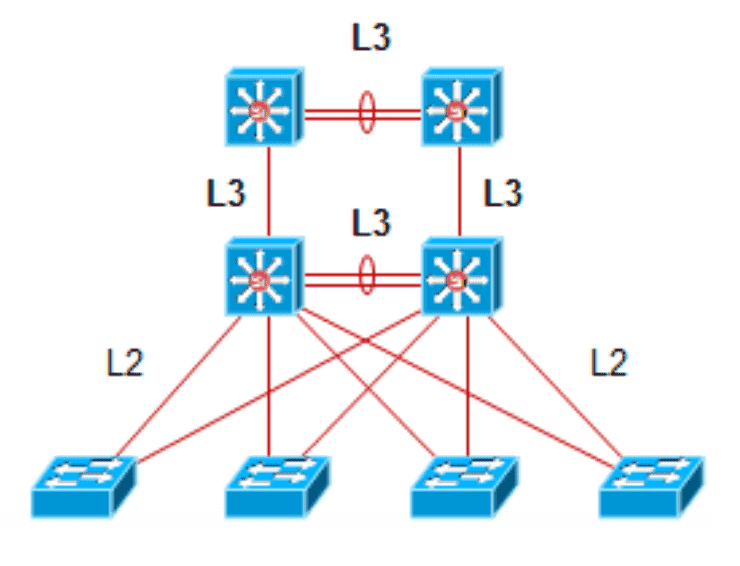
Figure 1: 基于3层交换的园区网架构
1 VTP
1.1 运行 VTP 前提
- 交换机之间起 Trunk
- 域名需要相同,默认域名为 null,只能被同步
- 认证
1.2 操作模式
1.2.1 Server(default)
- 创建,修改,删除 VLANs
- 发送或转发 advertisements
- 同步1 VLAN 配置
- 保存配置(保存在 vlan.dat)
1.2.2 Client
- 不允许 创建,修改,删除 VLANs
- 只转发 advertisements
- 同步 VLAN 配置
- 不 保存配置
1.2.3 Transparent
- 创建,修改,删除 本地 VLANs
- 只转发 advertisements
- 不 同步 VLAN 配置
- 保存配置(保存在 startup-config 中)
1.3 Pruning 2
用于修剪泛洪流量,即广播/组播/未知单播不会被泛洪到 有 VLAN 信息,但是没有 VLAN 接口 的交换机上。
不需要在每台交换机上都开启,在 "根" 上那个 Switch 上开启就可以,会通过 VTP 协议同步到每个交换机上的。
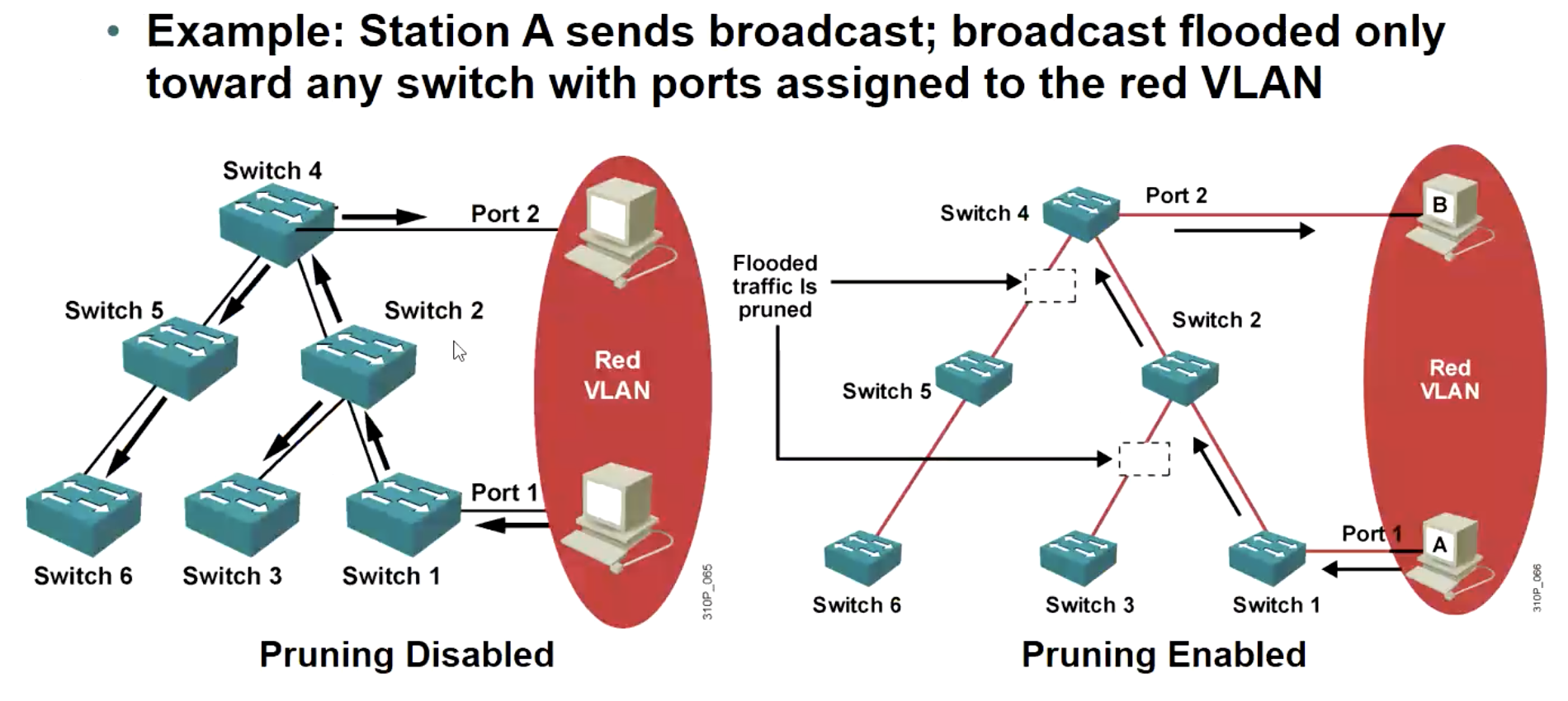
2 VLAN 间路由
2.1 单臂路由
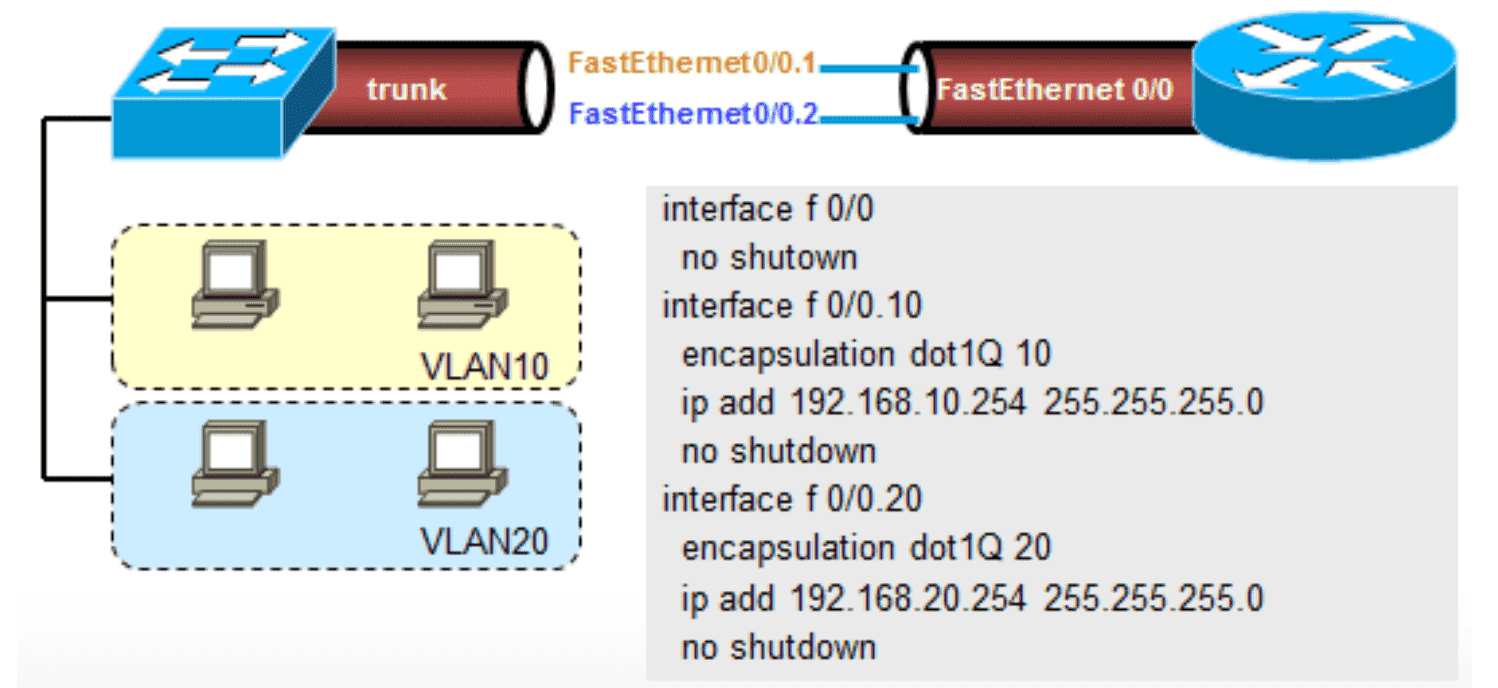
Figure 3: 单臂路由示意图
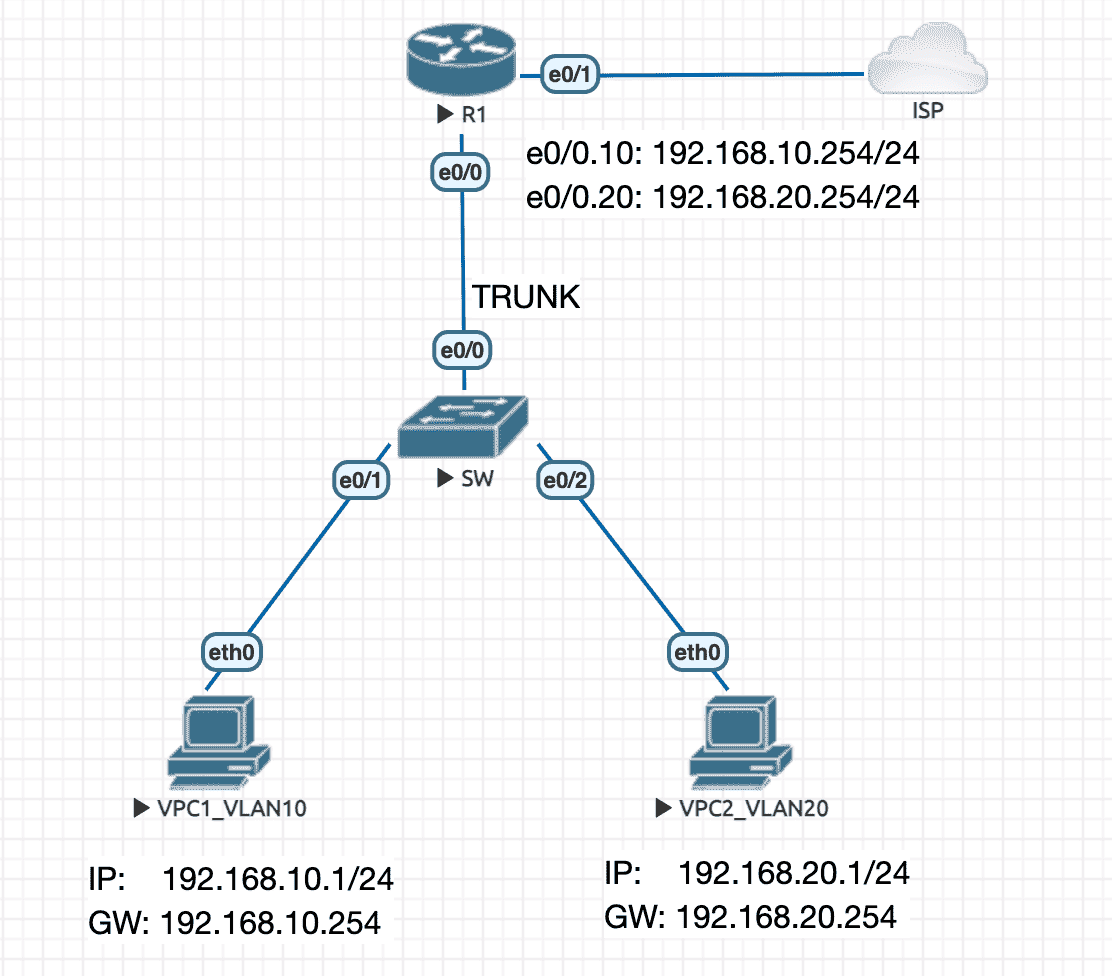
Figure 4: 实验拓扑
R1
interface Ethernet0/0.10 encapsulation dot1Q 10 ip address 192.168.10.254 255.255.255.0 ip nat inside ! interface Ethernet0/0.20 encapsulation dot1Q 20 ip address 192.168.20.254 255.255.255.0 ip nat inside ! interface Ethernet0/1 ip address dhcp ip nat outside ! ip nat inside source list NAT_ACL interface Ethernet0/1 overload ! ip access-list standard NAT_ACL permit 192.168.10.0 0.0.0.255 permit 192.168.20.0 0.0.0.255
SW
interface Ethernet0/0 switchport trunk encapsulation dot1q switchport mode trunk ! interface Ethernet0/1 switchport access vlan 10 switchport mode access ! interface Ethernet0/2 switchport access vlan 20 switchport mode access !
2.2 SVI
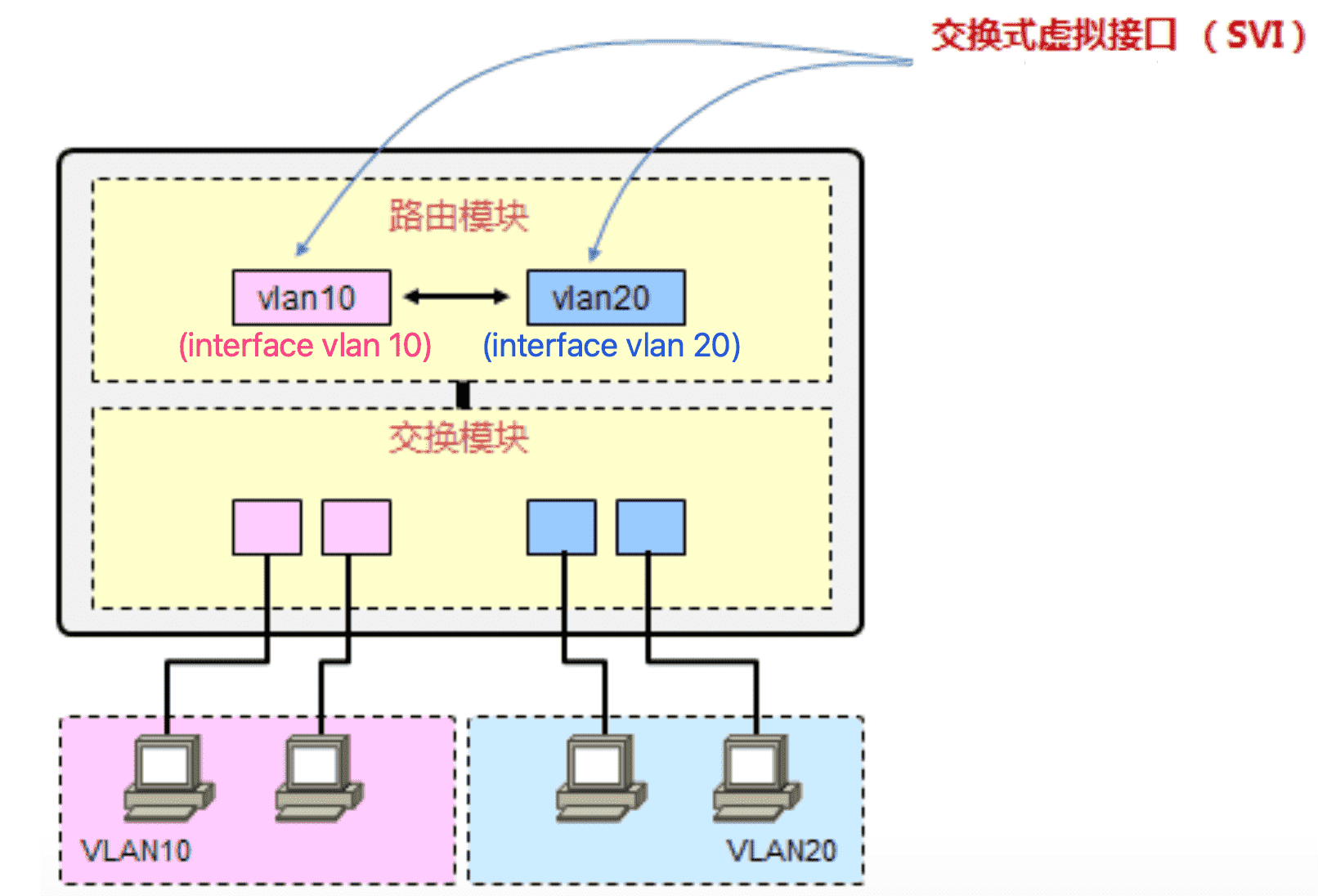
Figure 5: 虚拟接口示意图
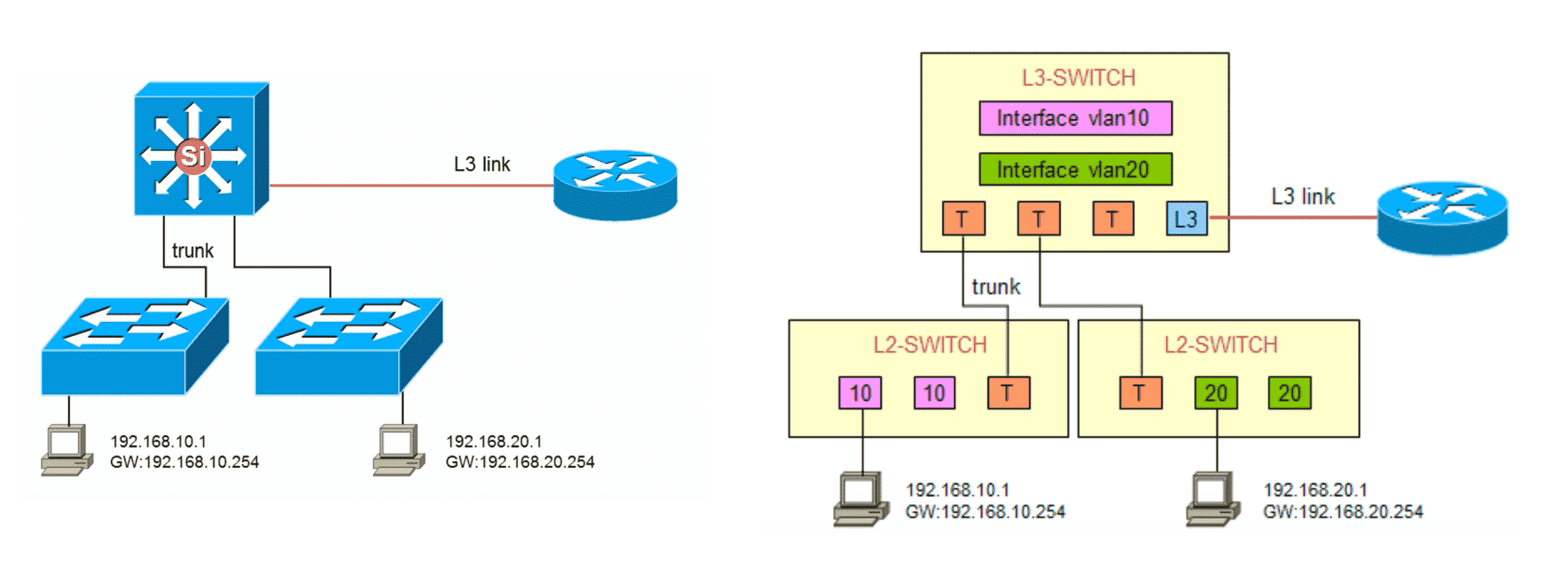
Figure 6: 经典部署案例
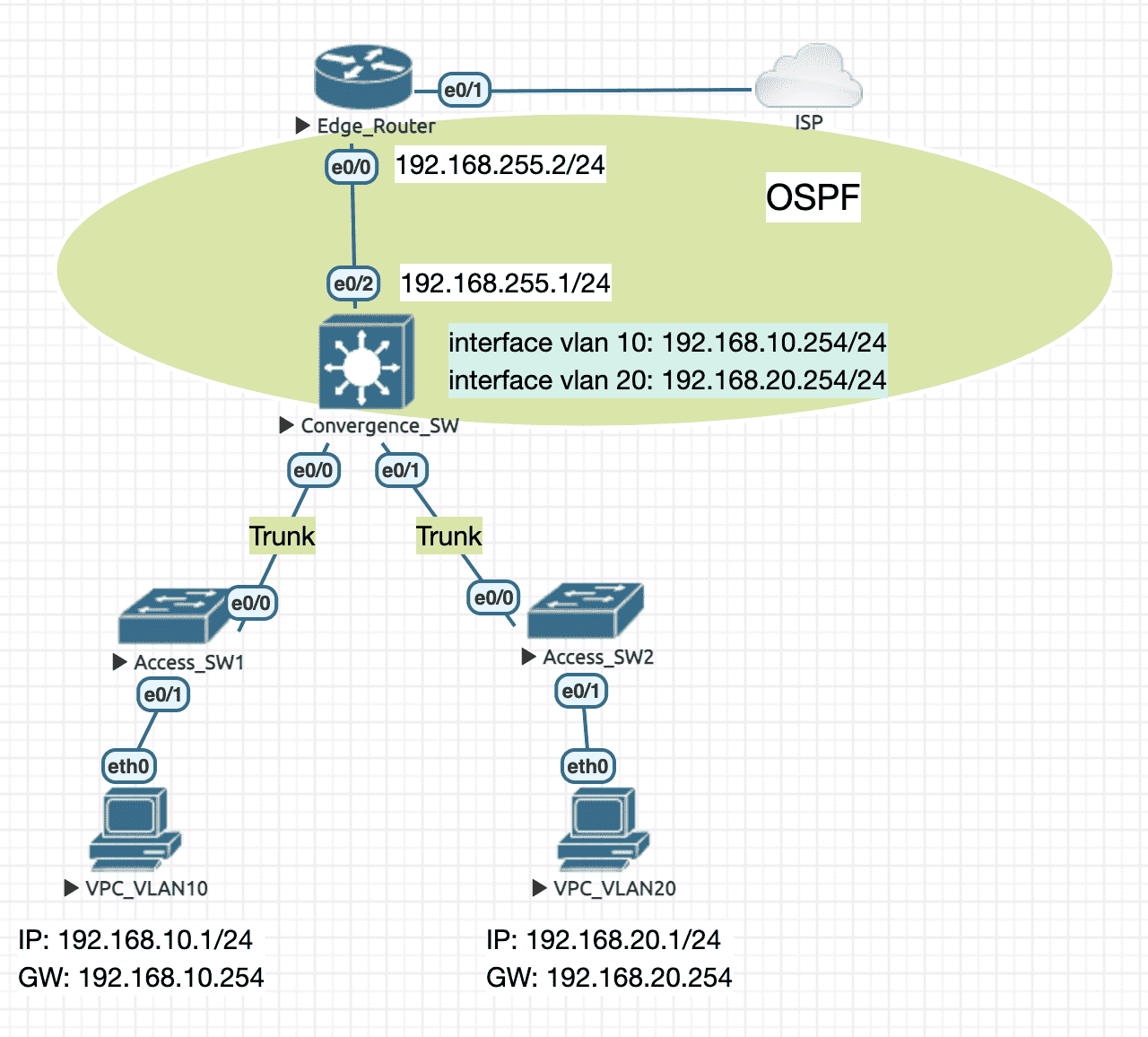
Figure 7: 实验拓扑
Edge Router
interface Ethernet0/0 ip address 192.168.255.2 255.255.255.0 ip nat inside duplex auto ! interface Ethernet0/1 ip address dhcp ip nat outside duplex auto ! router ospf 1 router-id 1.1.1.1 network 192.168.255.2 0.0.0.0 area 0 default-information originate ! ip access-list standard NAT_ACL permit 192.168.0.0 0.0.255.255 ! ip nat inside source list NAT_ACL interface Ethernet0/1 overloadConvergence Switch
ip routing # 开启路由功能 ! interface Ethernet0/0 switchport trunk encapsulation dot1q switchport mode trunk ! interface Ethernet0/1 switchport trunk encapsulation dot1q switchport mode trunk ! interface Ethernet0/2 no switchport ip address 192.168.255.1 255.255.255.0 ! interface Vlan10 ip address 192.168.10.254 255.255.255.0 ! interface Vlan20 ip address 192.168.20.254 255.255.255.0 ! router ospf 1 router-id 2.2.2.2 network 192.168.10.254 0.0.0.0 area 0 network 192.168.20.254 0.0.0.0 area 0 network 192.168.255.1 0.0.0.0 area 0
3 EtherChannel
这项 技术 称为 EtherChannel ,使用的 命令 是 channel-group , 逻辑接口 显示为 port-channel 。(问你爽未 🤔 )
3.1 先决条件
以太通道一旦建立完成后,就形成了一个逻辑接口,后续针对该接口的配置要在 port-channel 逻辑接口中完成。
同时,隶属于一个 port-channel 的物理接口需有相同的如下配置:
- 相同的 speed 和 duplex
- 相同的接口模式(access/trunk)
- 如果是 trunk 模式,那么 \(native vlan\) 及 \(allowed vlan\) 需相同
- 如果是 access 模式,所属 \(vlan\) 需相同
3.2 配置
- 选择用于 Channel 的端口
- 选择 PAgP 或 LACP
- 在接口组上配置 channel-group
- 设置 channel-group ID
- 根据特定的协议,选择接口模式(PAgP:on/desireable/auto/off;LACP:on/active/passive/off)
- 后续可以对生成的逻辑接口 port-channel 进行配置
3.2.1 二层通道
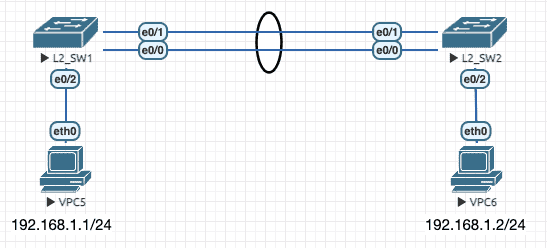
Figure 8: 二层通道拓扑
L2_SW1(config)#interface range e0/0-1 L2_SW1(config-if-range)#switchport trunk encapsulation dot1q L2_SW1(config-if-range)#switchport mode trunk L2_SW1(config-if-range)#channel-protocol lacp L2_SW1(config-if-range)#channel-group 1 mode active # 对端也要用相同的 channel group ID Creating a port-channel interface Port-channel 1 *May 22 02:05:35.174: %LINEPROTO-5-UPDOWN: Line protocol on Interface Ethernet0/0, changed state to up *May 22 02:05:35.175: %LINEPROTO-5-UPDOWN: Line protocol on Interface Ethernet0/1, changed state to up *May 22 02:05:39.978: %LINK-3-UPDOWN: Interface Port-channel1, changed state to up *May 22 02:05:40.978: %LINEPROTO-5-UPDOWN: Line protocol on Interface Port-channel1, changed state to up L2_SW1#show etherchannel 1 summary Flags: D - down P - bundled in port-channel I - stand-alone s - suspended H - Hot-standby (LACP only) R - Layer3 S - Layer2 U - in use N - not in use, no aggregation f - failed to allocate aggregator M - not in use, minimum links not met m - not in use, port not aggregated due to minimum links not met u - unsuitable for bundling w - waiting to be aggregated d - default port A - formed by Auto LAG Number of channel-groups in use: 1 Number of aggregators: 1 Group Port-channel Protocol Ports ------+-------------+-----------+----------------------------------------------- 1 Po1(SU) LACP Et0/0(P) Et0/1(P)
3.2.2 三层通道

Figure 9: 三层通道拓扑
L3_SW1(config)#interface range e0/0-1 L3_SW1(config-if-range)#no switchport L3_SW1(config-if-range)#no ip address L3_SW1(config-if-range)#channel-group 1 mode desirable # 通过 mode 可以自动判断出使用的是 PAgP Creating a port-channel interface Port-channel 1 L3_SW1(config-if-range)#no sh L3_SW1(config-if-range)#int po1 L3_SW1(config-if)#ip add 192.168.1.1 255.255.255.0 L3_SW1(config-if)#no sh *May 22 02:21:44.074: %LINEPROTO-5-UPDOWN: Line protocol on Interface Ethernet0/1, changed state to up *May 22 02:21:44.113: %LINEPROTO-5-UPDOWN: Line protocol on Interface Ethernet0/0, changed state to up *May 22 02:21:46.867: %LINK-3-UPDOWN: Interface Port-channel1, changed state to up *May 22 02:21:47.871: %LINEPROTO-5-UPDOWN: Line protocol on Interface Port-channel1, changed state to up L3_SW1#show etherchannel 1 summary Flags: D - down P - bundled in port-channel I - stand-alone s - suspended H - Hot-standby (LACP only) R - Layer3 S - Layer2 U - in use N - not in use, no aggregation f - failed to allocate aggregator M - not in use, minimum links not met m - not in use, port not aggregated due to minimum links not met u - unsuitable for bundling w - waiting to be aggregated d - default port A - formed by Auto LAG Number of channel-groups in use: 1 Number of aggregators: 1 Group Port-channel Protocol Ports ------+-------------+-----------+----------------------------------------------- 1 Po1(RU) PAgP Et0/0(P) Et0/1(P)
4 网关冗余
4.1 HSRP 3
将 同一个广播域中 (因为 HSRP 通信依赖组播) 的多台路由器上某个 接口 加入同一个 HSRP 组后, 该 HSRP 组会 虚拟 出一台路由器, 这个虚拟路由器的 IP 地址,就是内网 PC 需要配置的网关地址,而虚拟路由器的 MAC ,就是网关 IP 对应的 MAC 。
HSRP 组内的成员之间会进行选举 ,选出一个 Active 路由器,这个路由器承担实际的流量转发任务,并响应内网对于网关 IP 的 ARP 查询。
HSRP 组内的其他路由器,为 Standby 状态,实时侦听 Active 路由器的状态,以便能够在 Active 路由器故障后立即进行切换。
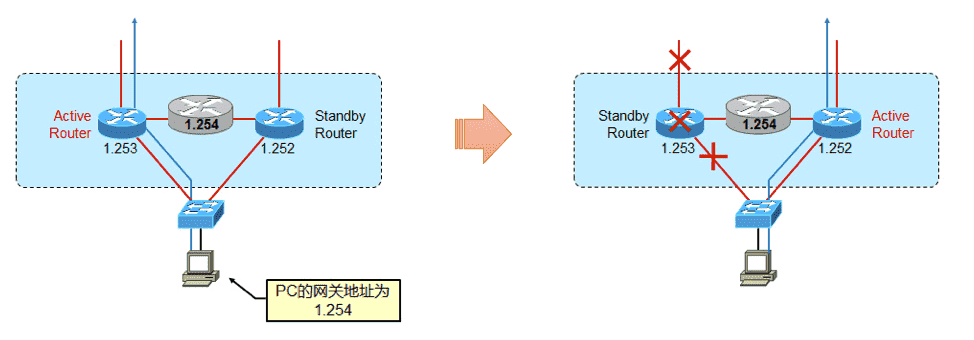
Figure 10: 逻辑示意图
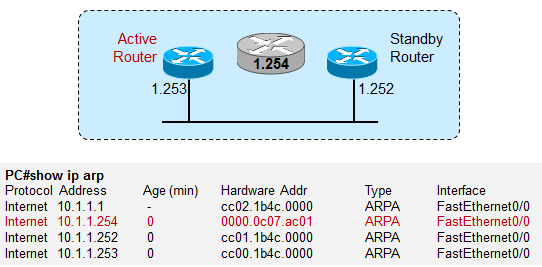
Figure 11: HSRP 使用 0000.0c07.acxx 作为虚拟路由器的 MAC , 其中 xx 是该 HSRP 组 ID
4.1.1 单组 HSRP
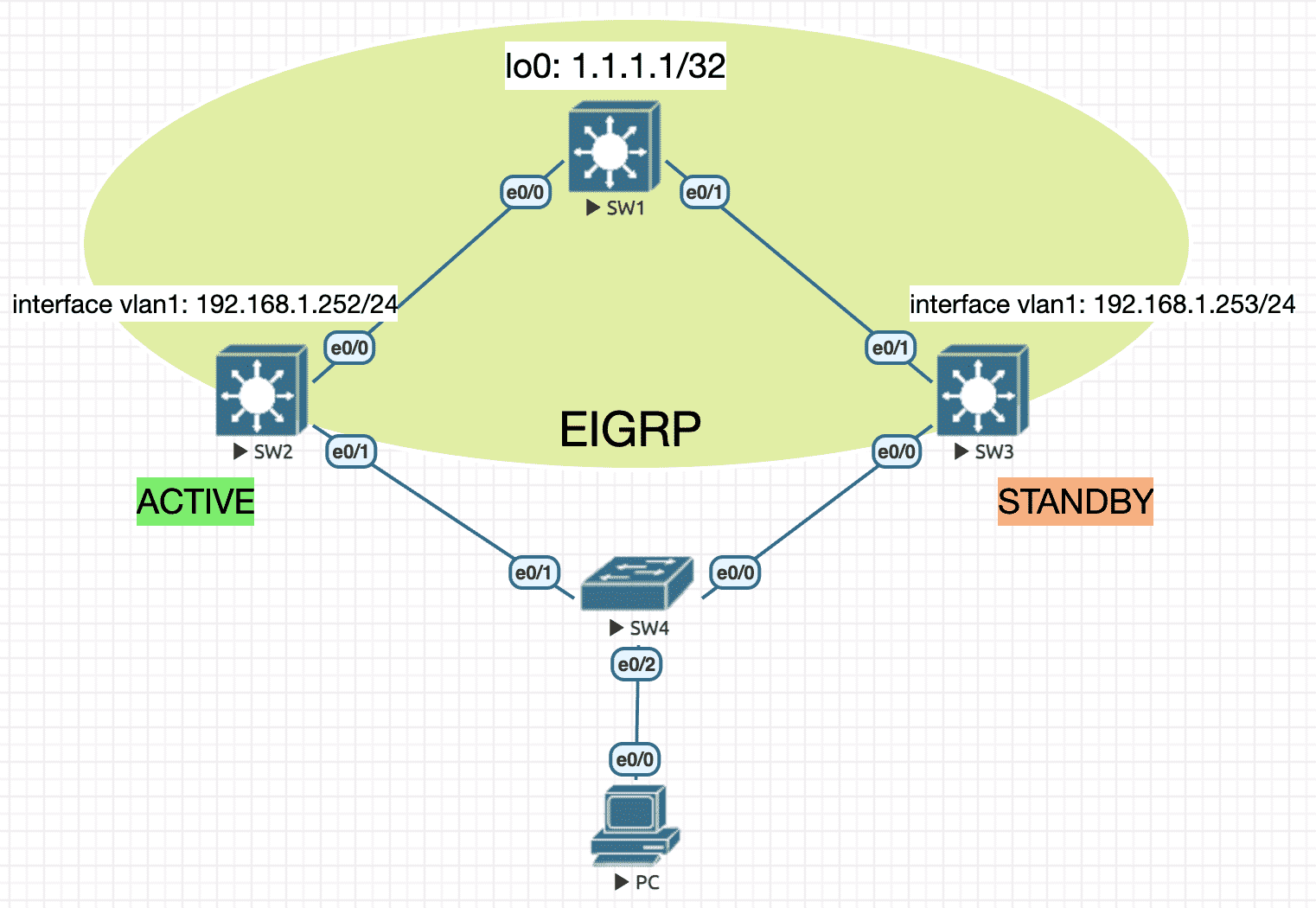
Figure 12: 实验环境
实验配置
----------------- SW1 ---------------------- en conf t ip routing hostname SW1 no ip do lo line con 0 exec-timeout 0 0 logging synchronous exit int lo0 ip address 1.1.1.1 255.255.255.255 int e0/0 no switchport ip address 10.1.12.1 255.255.255.0 no sh int e0/1 no switchport ip address 10.1.13.1 255.255.255.0 no sh router eigrp 90 network 10.1.12.1 0.0.0.0 network 10.1.13.1 0.0.0.0 network 1.1.1.1 0.0.0.0 ----------------- SW2 ---------------------- en conf t ip routing hostname SW2 no ip do lo line con 0 exec-timeout 0 0 logging synchronous exit int e0/0 no switchport ip address 10.1.12.2 255.255.255.0 no sh exit track 1 interface e0/0 ip routing ! define track obj for uplink int vlan1 ip address 192.168.1.252 255.255.255.0 no sh standby 1 ip 192.168.1.254 standby 1 priority 120 ! default priority is 100 standby 1 preempt ! default is non-preempt standby 1 track 1 decrement 50 ! when uplink is down, priority will be decremented by 50 router eigrp 90 network 10.1.12.2 0.0.0.0 network 192.168.1.252 0.0.0.0 ----------------- SW3 ---------------------- en conf t ip routing hostname SW3 no ip do lo line con 0 exec-timeout 0 0 logging synchronous exit int e0/1 no switchport ip address 10.1.13.3 255.255.255.0 no sh int vlan1 ip address 192.168.1.253 255.255.255.0 no sh standby 1 preempt standby 1 ip 192.168.1.254 router eigrp 90 network 10.1.13.3 0.0.0.0 network 192.168.1.253 0.0.0.0 ----------------- PC ---------------------- en conf t no ip routing ip default-gateway 192.168.1.254 hostname PC no ip do lo line con 0 exec-timeout 0 0 logging synchronous exit int e0/0 ip address 192.168.1.1 255.255.255.0 no sh
查看 standby 信息
SW2#sh standby brief P indicates configured to preempt. | Interface Grp Pri P State Active Standby Virtual IP Vl1 1 120 P Active local 192.168.1.253 192.168.1.254 SW2#sh standby Vlan1 - Group 1 State is Active 2 state changes, last state change 00:01:37 Virtual IP address is 192.168.1.254 Active virtual MAC address is 0000.0c07.ac01 (MAC In Use) Local virtual MAC address is 0000.0c07.ac01 (v1 default) Hello time 3 sec, hold time 10 sec Next hello sent in 1.760 secs Preemption enabled Active router is local Standby router is 192.168.1.253, priority 100 (expires in 8.336 sec) Priority 120 (configured 120) Track object 1 state Up decrement 50 Group name is "hsrp-Vl1-1" (default)
查看转发路径
PC#traceroute 1.1.1.1 Type escape sequence to abort. Tracing the route to 1.1.1.1 VRF info: (vrf in name/id, vrf out name/id) 1 192.168.1.252 1 msec 1 msec 1 msec 2 10.1.12.1 1 msec * 1 msec
将 SW2 e0/0 下电并观察 standby 信息
SW2#sh standby brief
P indicates configured to preempt.
|
Interface Grp Pri P State Active Standby Virtual IP
Vl1 1 70 P Standby 192.168.1.253 local 192.168.1.254
再次观察转发路径
PC#traceroute 1.1.1.1
Type escape sequence to abort.
Tracing the route to 1.1.1.1
VRF info: (vrf in name/id, vrf out name/id)
1 192.168.1.253 1 msec 0 msec 0 msec
2 10.1.13.1 1 msec * 1 msec
4.1.2 多组 HSRP
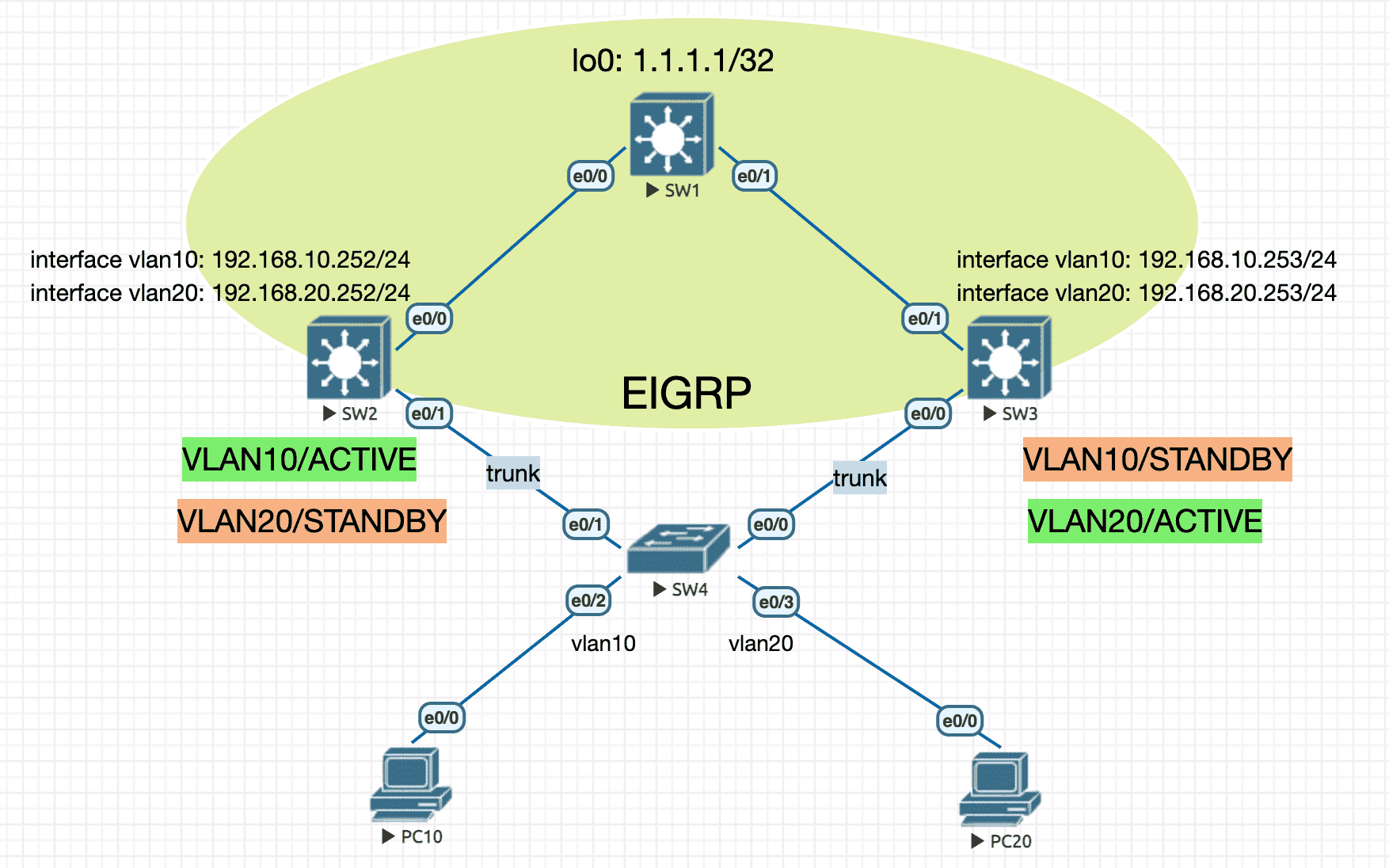
Figure 13: 实验环境
实验配置
----------------- SW1 ---------------------- en conf t ip routing hostname SW1 no ip do lo line con 0 exec-timeout 0 0 logging synchronous exit int lo0 ip address 1.1.1.1 255.255.255.255 int e0/0 no switchport ip address 10.1.12.1 255.255.255.0 no sh int e0/1 no switchport ip address 10.1.13.1 255.255.255.0 no sh router eigrp 90 network 10.1.12.1 0.0.0.0 network 10.1.13.1 0.0.0.0 network 1.1.1.1 0.0.0.0 ----------------- SW2 ---------------------- en conf t ip routing hostname SW2 no ip do lo line con 0 exec-timeout 0 0 logging synchronous exit vlan 10 name MYVLAN10 exit vlan 20 name MYVLAN20 exit int e0/0 no switchport ip address 10.1.12.2 255.255.255.0 no sh exit int e0/1 switchport trunk encapsulation dot1q switchport mode trunk exit int vlan10 ip address 192.168.10.252 255.255.255.0 no sh standby 10 ip 192.168.10.254 standby 10 priority 120 ! higher priority standby 10 preempt ! exit int vlan20 ip address 192.168.20.252 255.255.255.0 no sh standby 20 ip 192.168.20.254 standby 20 priority 100 ! lower priority standby 20 preempt ! exit router eigrp 90 network 10.1.12.2 0.0.0.0 network 192.168.10.252 0.0.0.0 network 192.168.20.252 0.0.0.0 ----------------- SW3 ---------------------- en conf t ip routing hostname SW3 no ip do lo line con 0 exec-timeout 0 0 logging synchronous exit vlan 10 name MYVLAN10 exit vlan 20 name MYVLAN20 exit int e0/0 switchport trunk encapsulation dot1q switchport mode trunk exit int e0/1 no switchport ip address 10.1.13.3 255.255.255.0 no sh int vlan10 ip address 192.168.10.253 255.255.255.0 no sh standby 10 preempt standby 10 priority 100 ! lower priority standby 10 ip 192.168.10.254 ! exit int vlan20 ip address 192.168.20.253 255.255.255.0 no sh standby 20 preempt standby 20 priority 120 ! higher priority standby 20 ip 192.168.20.254 ! exit router eigrp 90 network 10.1.13.3 0.0.0.0 network 192.168.10.253 0.0.0.0 network 192.168.20.253 0.0.0.0 ----------------- SW4 ---------------------- en conf t ip routing hostname SW4 no ip do lo line con 0 exec-timeout 0 0 logging synchronous exit vlan 10 name MYVLAN10 exit vlan 20 name MYVLAN20 exit int range e0/0,e0/1 switchport trunk encapsulation dot1q switchport mode trunk exit int e0/2 switchport mode access switchport access vlan 10 exit int e0/3 switchport mode access switchport access vlan 20 exit ----------------- PC10 ---------------------- en conf t no ip routing ip default-gateway 192.168.10.254 hostname PC10 no ip do lo line con 0 exec-timeout 0 0 logging synchronous exit int e0/0 ip address 192.168.10.1 255.255.255.0 no sh ----------------- PC20 ---------------------- en conf t no ip routing ip default-gateway 192.168.20.254 hostname PC20 no ip do lo line con 0 exec-timeout 0 0 logging synchronous exit int e0/0 ip address 192.168.20.1 255.255.255.0 no sh
观察 traceroute
PC10#traceroute 1.1.1.1 Type escape sequence to abort. Tracing the route to 1.1.1.1 VRF info: (vrf in name/id, vrf out name/id) 1 192.168.10.252 1 msec 1 msec 1 msec 2 10.1.12.1 1 msec * 2 msec PC20#traceroute 1.1.1.1 Type escape sequence to abort. Tracing the route to 1.1.1.1 VRF info: (vrf in name/id, vrf out name/id) 1 192.168.20.253 1 msec 1 msec 0 msec 2 10.1.13.1 1 msec * 2 msec
4.1.3 MST+HSRP
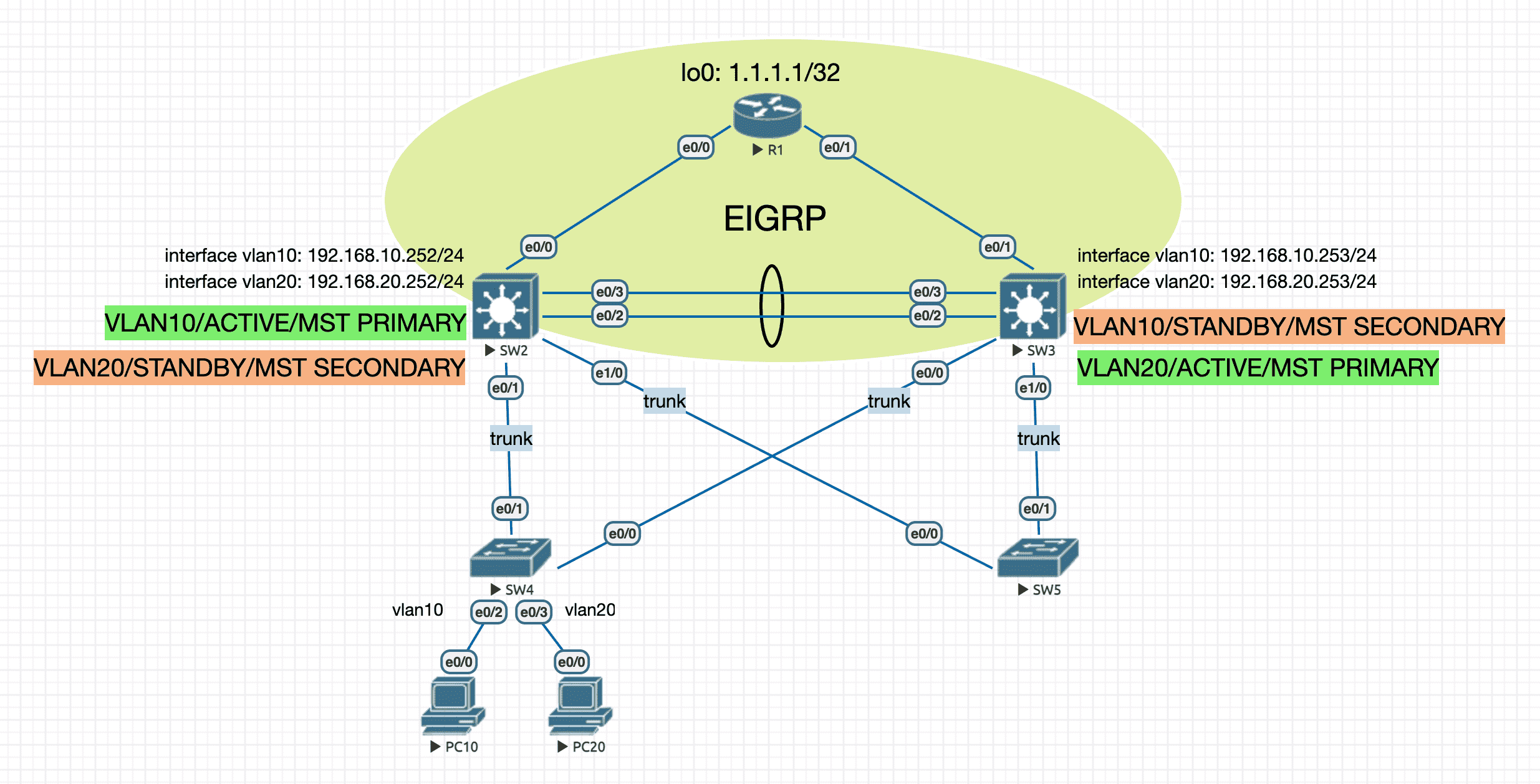
Figure 14: 双核心解决方案
使用 MST 实现 二层冗余 ,同时将不同 VLAN 的生成树主根分布在不同的汇聚层交换机上以兼顾流量负载均衡。
使用 HSRP 实现 三层网关的冗余 ,而且 ACTIVE HSRP 与相应 VLAN 的 MST 主根 落在同一台设备上。
实验配置
----------------- R1 ---------------------- en conf t hostname R1 no ip do lo line con 0 exec-timeout 0 0 logging synchronous exit int lo0 ip address 1.1.1.1 255.255.255.255 int e0/0 ip address 10.1.12.1 255.255.255.0 no shutdown int e0/1 ip address 10.1.13.1 255.255.255.0 no shutdown router eigrp 90 network 10.1.12.1 0.0.0.0 network 10.1.13.1 0.0.0.0 network 1.1.1.1 0.0.0.0 ----------------- SW2 ---------------------- en conf t ip routing hostname SW2 no ip do lo line con 0 exec-timeout 0 0 logging synchronous exit vlan 10 name MYVLAN10 vlan 20 name MYVLAN20 spanning-tree mode mst spanning-tree mst configuration name cisco.com instance 1 vlan 10 instance 2 vlan 20 exit spanning-tree mst 1 root primary spanning-tree mst 2 root secondary int range e0/2,e0/3 switchport trunk encapsulation dot1q switchport mode trunk channel-group 1 mode desirable int e0/0 no switchport ip address 10.1.12.2 255.255.255.0 no sh int range e0/1,e1/0 switchport trunk encapsulation dot1q switchport mode trunk int vlan10 ip address 192.168.10.252 255.255.255.0 no sh standby 10 ip 192.168.10.254 standby 10 priority 120 ! higher priority standby 10 preempt ! int vlan20 ip address 192.168.20.252 255.255.255.0 no sh standby 20 ip 192.168.20.254 standby 20 priority 100 ! lower priority standby 20 preempt ! router eigrp 90 network 10.1.12.2 0.0.0.0 network 192.168.10.252 0.0.0.0 network 192.168.20.252 0.0.0.0 ----------------- SW3 ---------------------- en conf t ip routing hostname SW3 no ip do lo line con 0 exec-timeout 0 0 logging synchronous exit vlan 10 name MYVLAN10 vlan 20 name MYVLAN20 spanning-tree mode mst spanning-tree mst configuration name cisco.com instance 1 vlan 10 instance 2 vlan 20 exit spanning-tree mst 1 root secondary spanning-tree mst 2 root primary int range e0/2,e0/3 switchport trunk encapsulation dot1q switchport mode trunk channel-group 1 mode desirable int range e0/0,e1/0 switchport trunk encapsulation dot1q switchport mode trunk int e0/1 no switchport ip address 10.1.13.3 255.255.255.0 no sh int vlan10 ip address 192.168.10.253 255.255.255.0 no sh standby 10 preempt standby 10 priority 100 ! lower priority standby 10 ip 192.168.10.254 ! int vlan20 ip address 192.168.20.253 255.255.255.0 no sh standby 20 preempt standby 20 priority 120 ! higher priority standby 20 ip 192.168.20.254 ! router eigrp 90 network 10.1.13.3 0.0.0.0 network 192.168.10.253 0.0.0.0 network 192.168.20.253 0.0.0.0 ----------------- SW4 ---------------------- en conf t ip routing hostname SW4 no ip do lo line con 0 exec-timeout 0 0 logging synchronous exit vlan 10 name MYVLAN10 exit vlan 20 name MYVLAN20 exit int range e0/0,e0/1 switchport trunk encapsulation dot1q switchport mode trunk exit int e0/2 switchport mode access switchport access vlan 10 exit int e0/3 switchport mode access switchport access vlan 20 exit ----------------- SW5 ---------------------- en conf t ip routing hostname SW5 no ip do lo line con 0 exec-timeout 0 0 logging synchronous exit vlan 10 name MYVLAN10 exit vlan 20 name MYVLAN20 exit int range e0/0,e0/1 switchport trunk encapsulation dot1q switchport mode trunk exit ----------------- PC10 ---------------------- en conf t no ip routing ip default-gateway 192.168.10.254 hostname PC10 no ip do lo line con 0 exec-timeout 0 0 logging synchronous exit int e0/0 ip address 192.168.10.1 255.255.255.0 no sh ----------------- PC20 ---------------------- en conf t no ip routing ip default-gateway 192.168.20.254 hostname PC20 no ip do lo line con 0 exec-timeout 0 0 logging synchronous exit int e0/0 ip address 192.168.20.1 255.255.255.0 no sh
4.2 VRRP
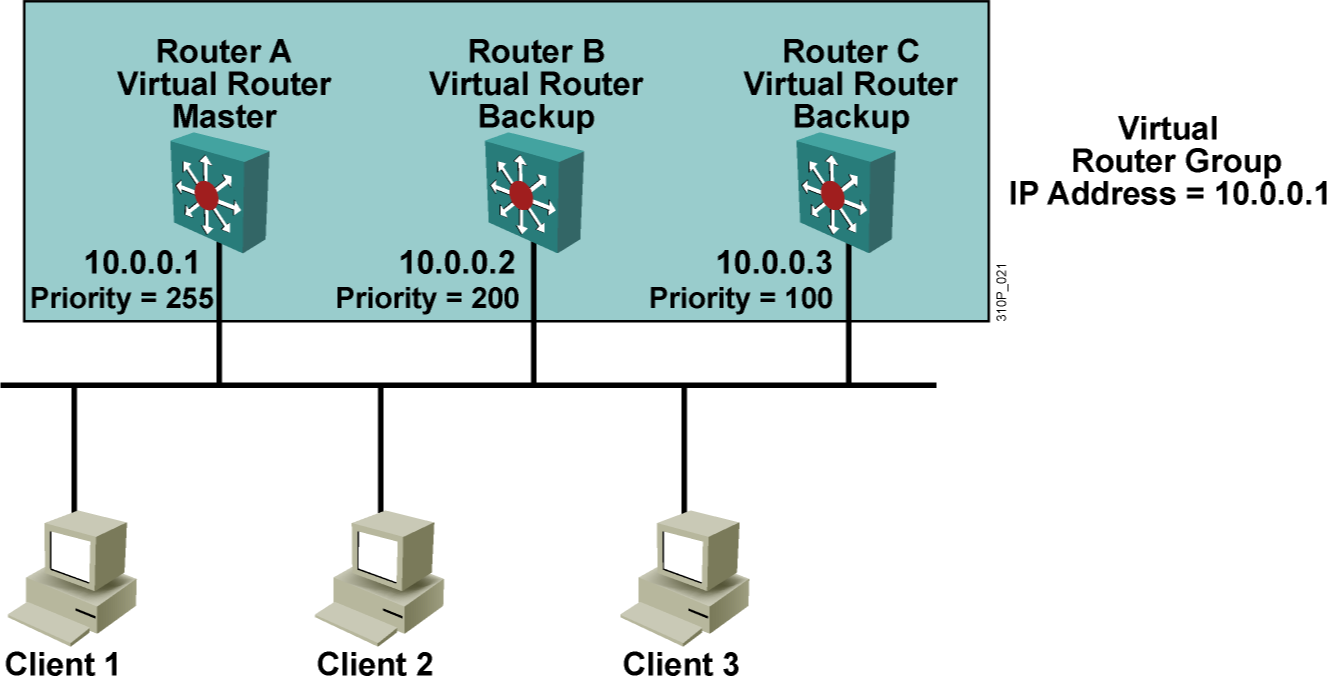
Figure 15: Virtual Route Redundancy Protocol
4.2.1 与 HSRP 的区别
- 使用 Master/Slave 表示主备关系
- VIP 可以是虚拟出来的, 也可以是真实存在的地址(此时 priority=255) ,而 HSRP 只能使用虚拟出来的 IP 4
- 只有 Master 每 1 秒发一次 Hello
- 默认启用抢占
- 不抑制 ICMP redirect 功能,而 HSRP 不使用 redirect
4.2.2 实验
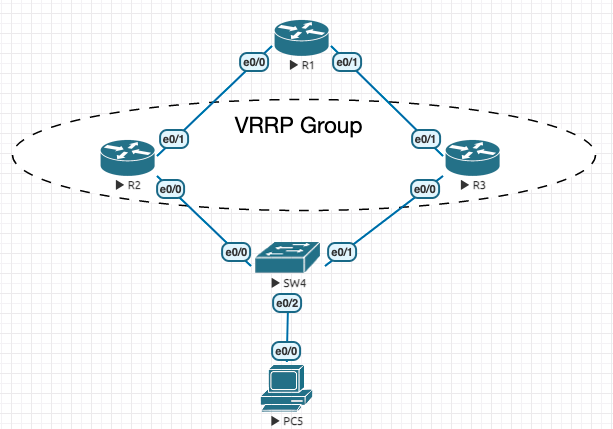
Figure 16: 实验环境
配置清单
----------------- R1 ---------------------- en conf t hostname R1 no ip do lo line con 0 exec-timeout 0 0 logging synchronous exit int e0/0 ip address 10.1.12.1 255.255.255.0 no sh ! ip route 192.168.0.0 255.255.0.0 10.1.12.2 ip route 192.168.0.0 255.255.0.0 10.1.13.3 int e0/1 ip address 10.1.13.1 255.255.255.0 no sh ! end ----------------- R2 ---------------------- en conf t hostname R2 no ip do lo line con 0 exec-timeout 0 0 logging synchronous exit int e0/0 ip address 192.168.23.2 255.255.255.0 no sh ! int e0/1 ip address 10.1.12.2 255.255.255.0 no sh ! ip route 0.0.0.0 0.0.0.0 10.1.12.1 int e0/0 vrrp 10 ip 192.168.23.2 ! real ip is also allowed ! no need to set priority here. Priority change will have no effect whilst interface is VRRP address owner ! end ----------------- R3 ---------------------- en conf t hostname R3 no ip do lo line con 0 exec-timeout 0 0 logging synchronous exit int e0/0 ip address 192.168.23.3 255.255.255.0 no sh ! int e0/1 ip address 10.1.13.3 255.255.255.0 no sh ! ip route 0.0.0.0 0.0.0.0 10.1.13.1 int e0/0 vrrp 10 ip 192.168.23.2 vrrp 10 priority 100 ! end ----------------- PC5 ---------------------- en conf t hostname PC5 no ip do lo line con 0 exec-timeout 0 0 logging synchronous exit no ip routing ip default-gateway 192.168.23.2 int e0/0 ip address 192.168.23.5 255.255.255.0 no sh ! end
查看状态:
R3#sh vrrp Ethernet0/0 - Group 10 State is Backup Virtual IP address is 192.168.23.2 Virtual MAC address is 0000.5e00.010a Advertisement interval is 1.000 sec Preemption enabled Priority is 100 Master Router is 192.168.23.2, priority is 255 Master Advertisement interval is 1.000 sec Master Down interval is 3.609 sec (expires in 2.812 sec) R3#sh vrrp brief Interface Grp Pri Time Own Pre State Master addr Group addr Et0/0 10 100 3609 Y Backup 192.168.23.2 192.168.23.2
4.3 GLBP
网关 负载均衡 ,设计思想是 单虚拟 IP 多虚拟 MAC 。
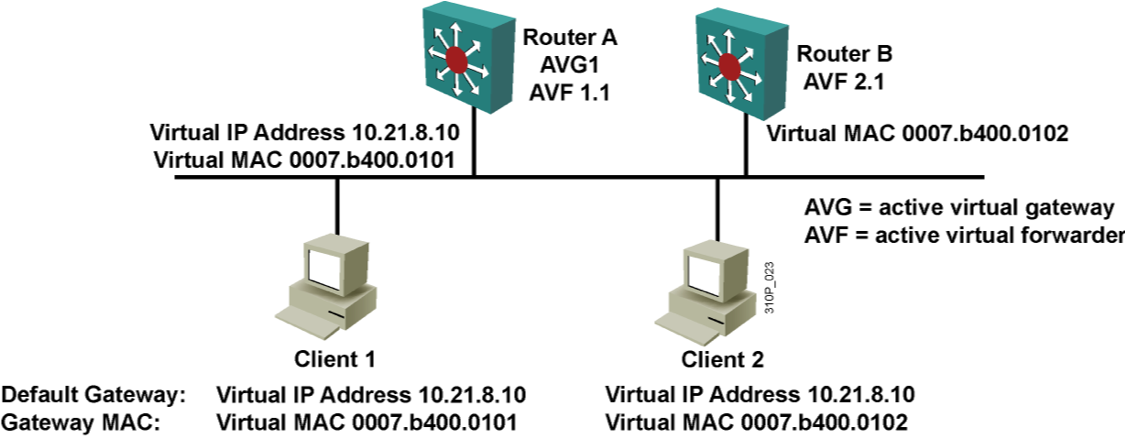
5 流量镜像
5.1 SPAN
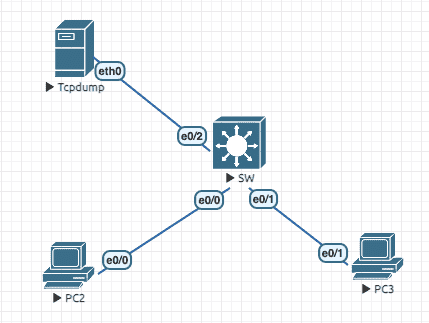
Figure 18: 实验环境(将e0/0镜像到e0/2)
实验配置
----------------- SW ---------------------- en conf t hostname SW no ip do lo line con 0 exec-timeout 0 0 logging synchronous exit int range e0/0,e0/1 spanning-tree portfast ! nice to have exit monitor session 1 source interface e0/0 monitor session 1 destination interface e0/2 ----------------- PC2 ---------------------- en conf t hostname PC2 no ip do lo line con 0 exec-timeout 0 0 logging synchronous exit int e0/0 ip address 100.1.1.2 255.255.255.0 no sh ----------------- PC3 ---------------------- en conf t hostname PC3 no ip do lo line con 0 exec-timeout 0 0 logging synchronous exit int e0/1 ip address 100.1.1.3 255.255.255.0 no sh
查看 monitor session 信息
SW#sh monitor session 1
Session 1
---------
Type : Local Session
Source Ports :
Both : Et0/0
Destination Ports : Et0/2
Encapsulation : Native
SW#sh monitor session 1 detail
Session 1
---------
Type : Local Session
Description : -
Source Ports :
RX Only : None
TX Only : None
Both : Et0/0
Source VLANs :
RX Only : None
TX Only : None
Both : None
Source RSPAN VLAN : None
Destination Ports : Et0/2
Encapsulation : Native
Filter VLANs : None
Dest RSPAN VLAN : None
5.2 RSPAN
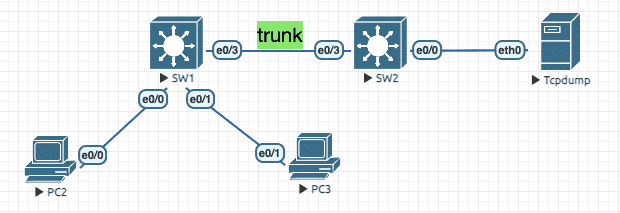
Figure 19: 实验环境
实验配置
----------------- SW1 ---------------------- en conf t hostname SW1 no ip do lo line con 0 exec-timeout 0 0 logging synchronous exit vlan 100 name REMOTE_VLAN_100 ! dedicated for rspan remote-span exit int range e0/0,e0/1 spanning-tree portfast ! nice to have exit int e0/3 switchport trunk encapsulation dot1q switchport mode trunk exit monitor session 1 source interface e0/0 monitor session 1 destination remote vlan 100 ----------------- SW2 ---------------------- en conf t hostname SW2 no ip do lo line con 0 exec-timeout 0 0 logging synchronous exit vlan 100 name REMOTE_VLAN_100 remote-span exit int e0/0 spanning-tree portfast ! nice to have exit int e0/3 switchport trunk encapsulation dot1q switchport mode trunk monitor session 1 source remote vlan 100 monitor session 1 destination interface e0/0 ----------------- PC2 ---------------------- en conf t hostname PC2 no ip do lo line con 0 exec-timeout 0 0 logging synchronous exit int e0/0 ip address 100.1.1.2 255.255.255.0 no sh ----------------- PC3 ---------------------- en conf t hostname PC3 no ip do lo line con 0 exec-timeout 0 0 logging synchronous exit int e0/1 ip address 100.1.1.3 255.255.255.0 no sh
查看 monitor session 信息
SW2#sh monitor session 1 Session 1 --------- Type : Remote Destination Session Source RSPAN VLAN : 100 Destination Ports : Et0/0 Encapsulation : Native SW2#sh monitor session 1 detail Session 1 --------- Type : Remote Destination Session Description : - Source Ports : RX Only : None TX Only : None Both : None Source VLANs : RX Only : None TX Only : None Both : None Source RSPAN VLAN : 100 Destination Ports : Et0/0 Encapsulation : Native Filter VLANs : None Dest RSPAN VLAN : None
6 网络服务
6.1 NTP 5
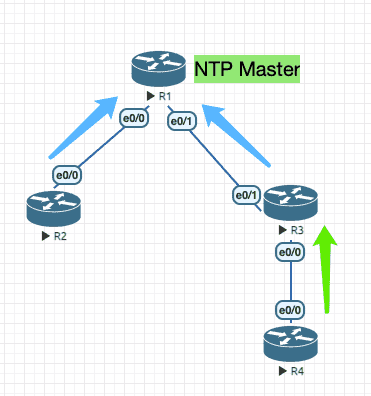
Figure 20: 实验环境
实验配置
----------------- R1 ----------------------
en
clock set 00:00:00 11 Jul 2021 ! set time
debug ntp events
conf t
hostname R1
no ip do lo
line con 0
exec-timeout 0 0
logging synchronous
exit
int e0/0
ip address 10.1.12.1 255.255.255.0
no sh
exit
int e0/1
ip address 10.1.13.1 255.255.255.0
no sh
exit
ntp master ! default stratum is 8
----------------- R2 ----------------------
en
debug ntp events
conf t
hostname R2
no ip do lo
line con 0
exec-timeout 0 0
logging synchronous
exit
int e0/0
ip address 10.1.12.2 255.255.255.0
no sh
exit
ntp server 10.1.12.1 ! sync with master
----------------- R3 ----------------------
en
debug ntp events
conf t
hostname R3
no ip do lo
line con 0
exec-timeout 0 0
logging synchronous
exit
int e0/0
ip address 10.1.34.3 255.255.255.0
no sh
int e0/1
ip address 10.1.13.3 255.255.255.0
no sh
exit
ntp server 10.1.13.1 ! sync with master
----------------- R4 ----------------------
en
debug ntp events
conf t
hostname R4
no ip do lo
line con 0
exec-timeout 0 0
logging synchronous
exit
int e0/0
ip address 10.1.34.4 255.255.255.0
no sh
ntp peer 10.1.34.3 ! sync with peer
6.2 DHCP
6.2.1 报文交互
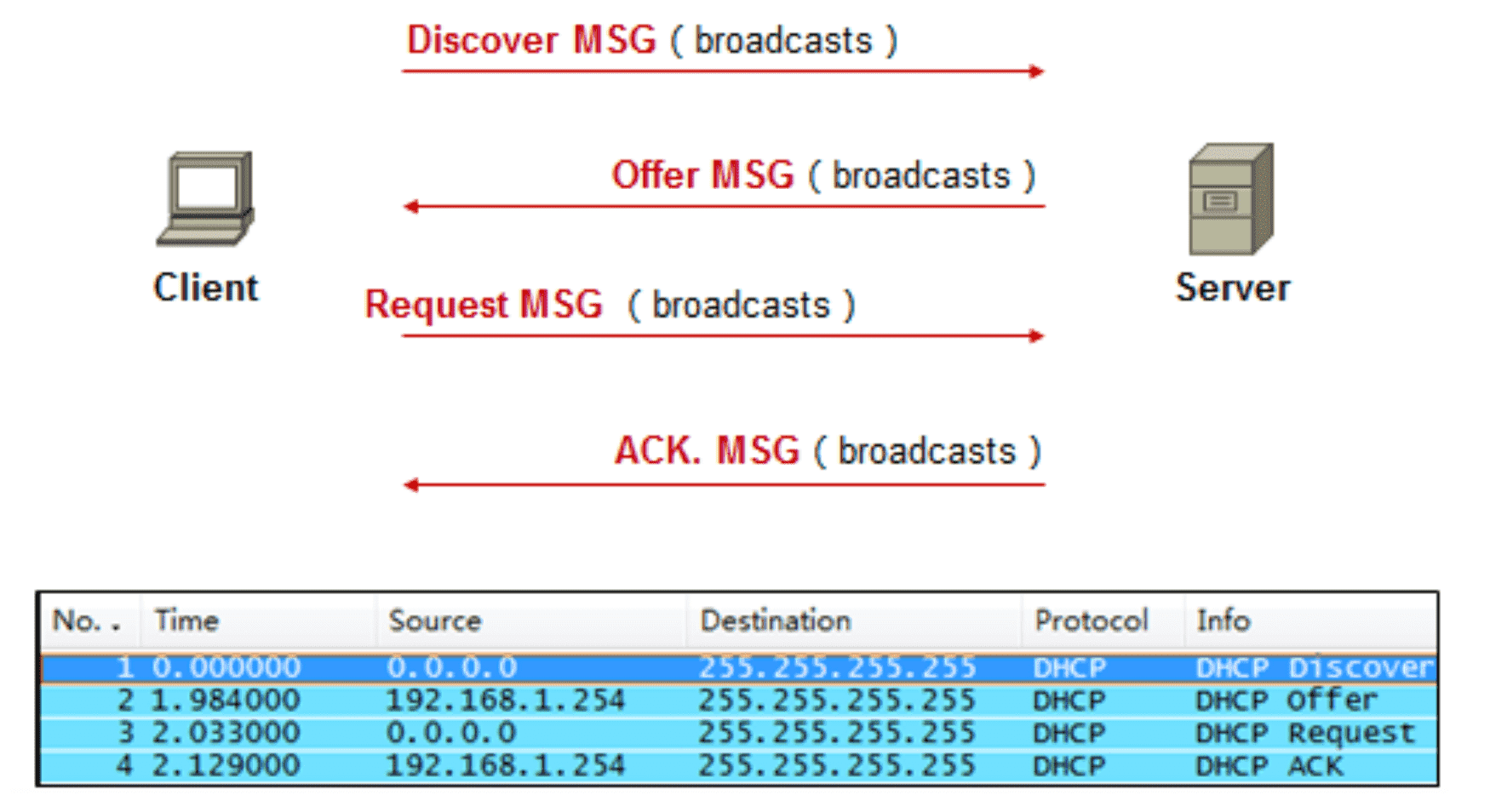
Figure 21: DHCP 报文交互过程
6.2.1.1 中继交互
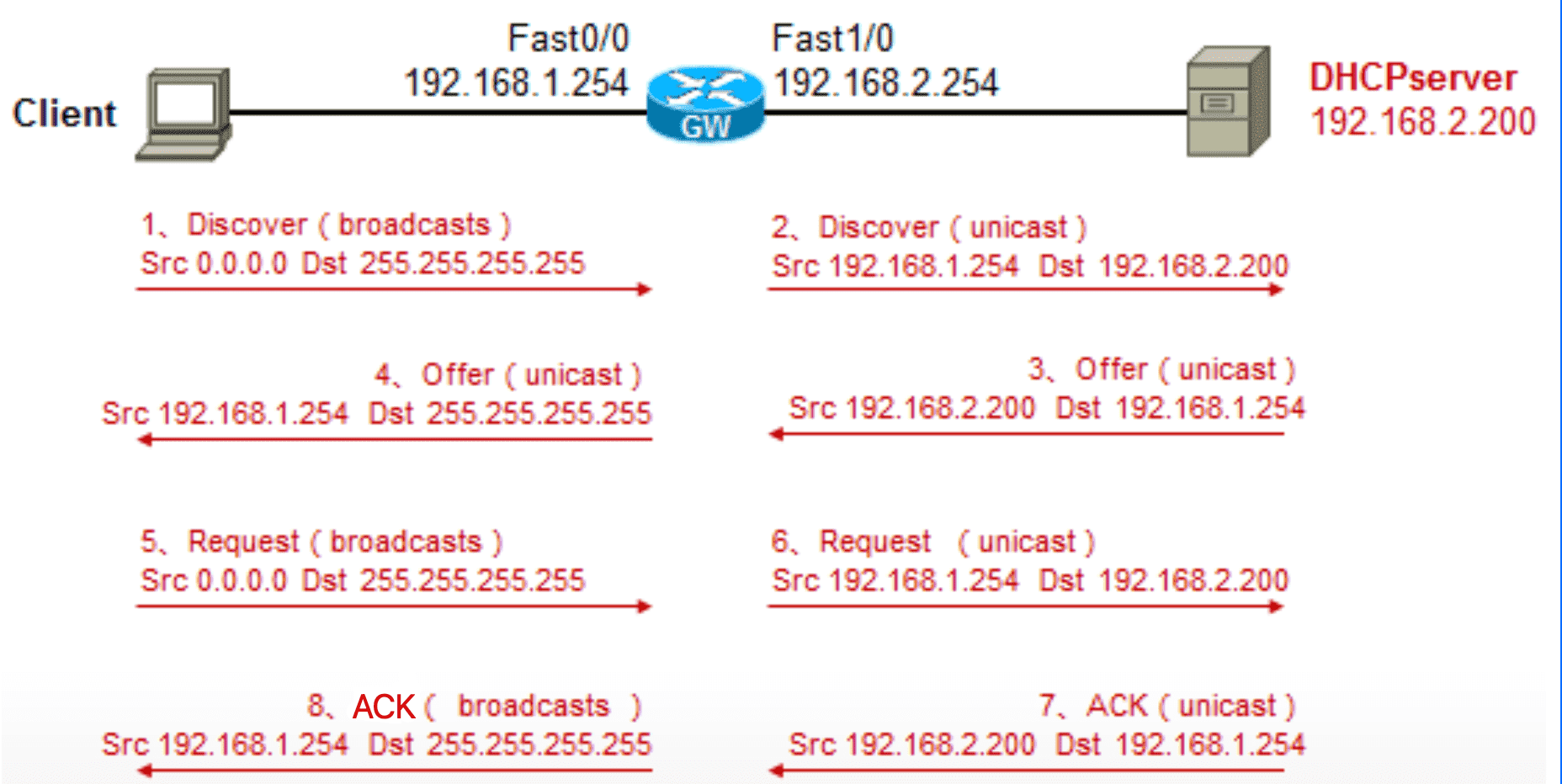
Figure 22: 中继交互过程
6.2.2 基本配置
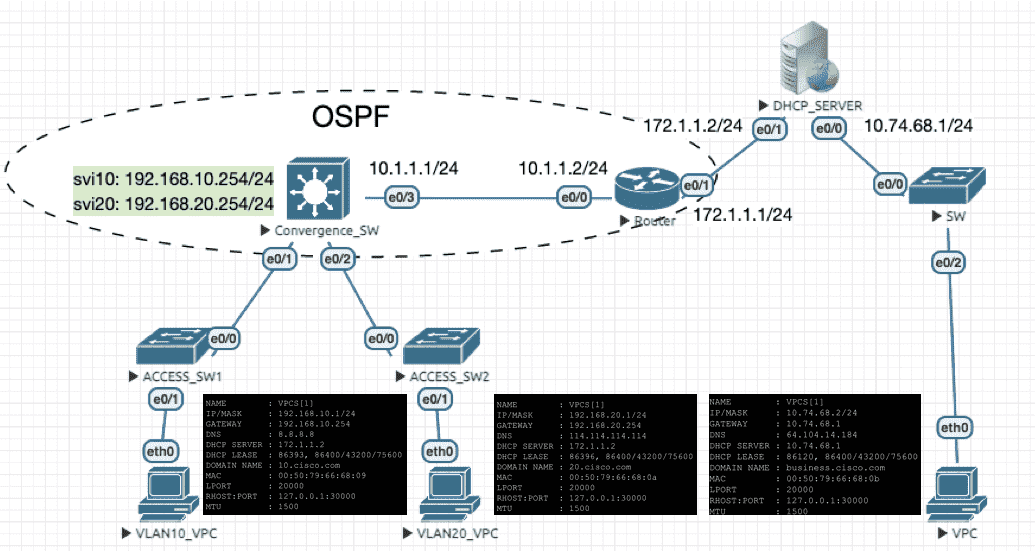
Figure 23: 实验环境
Convergence SW
interface Vlan10 ip address 192.168.10.254 255.255.255.0 ip helper-address 172.1.1.2 ! interface Vlan20 ip address 192.168.20.254 255.255.255.0 ip helper-address 172.1.1.2 !
DHCP Server
no ip routing ip default-gateway 172.1.1.1! ip dhcp excluded-address 192.168.10.254 # 排除某些 IP ip dhcp excluded-address 192.168.20.254 ip dhcp excluded-address 10.74.68.1 ! ip dhcp pool DHCP_POOL_10 network 192.168.10.0 255.255.255.0 default-router 192.168.10.254 # 网关 domain-name 10.cisco.com dns-server 8.8.8.8 ! ip dhcp pool DHCP_POOL_20 network 192.168.20.0 255.255.255.0 default-router 192.168.20.254 dns-server 114.114.114.114 domain-name 20.cisco.com ! # 如果不定义 POOL_68 ,则当 VPC 请求地址时,DHCP 服务会报错:DHCPD: there is no address pool for 10.74.68.1 # 说明地址池的选择由入口地址或是中继地址决定 ip dhcp pool DHCP_POOL_68 network 10.74.68.0 255.255.255.0 domain-name business.cisco.com dns-server 64.104.14.184 default-router 10.74.68.1
DHCP_Server#sh ip dhcp binding Bindings from all pools not associated with VRF: IP address Client-ID/ Lease expiration Type Hardware address/ User name 10.74.68.2 0100.5079.6668.0b May 22 2021 04:28 PM Automatic 192.168.10.1 0100.5079.6668.09 May 22 2021 04:14 PM Automatic 192.168.20.1 0100.5079.6668.0a May 22 2021 04:17 PM Automatic
6.3 DNS
ip dns server ip domain-lookup ip name-server 64.104.76.247 ! define A record ip host test.mysite.com 192.168.0.5 ip host mail.mysite.com 192.168.0.5 ! define MX record ip host mysite.com mx 10 mail.mysite.com ip host mysite.com mx 20 mail.isp.com
6.4 CA

初始配置
! ------------------ CA ------------------------ en conf t ip domain-name cisco.com alias exec ai sh ip int | in is.*up|Internet address|Secondary address alias exec ii sh ip int b | ex un alias exec i sh ip int b alias exec rr sh ip route | begin Gateway hostname CA no ip do lo line con 0 exec-timeout 0 0 logging synchronous int e0/0 ip add 192.168.1.10 255.255.255.0 no sh ! ! ------------------ Client-1 ------------------------ en conf t ip domain-name cisco.com alias exec ai sh ip int | in is.*up|Internet address|Secondary address alias exec ii sh ip int b | ex un alias exec i sh ip int b alias exec rr sh ip route | begin Gateway hostname Client-1 no ip do lo line con 0 exec-timeout 0 0 logging synchronous int e0/0 ip add 192.168.1.1 255.255.255.0 no sh ! ! ------------------ Client-2 ------------------------ en conf t ip domain-name cisco.com alias exec ai sh ip int | in is.*up|Internet address|Secondary address alias exec ii sh ip int b | ex un alias exec i sh ip int b alias exec rr sh ip route | begin Gateway hostname Client-2 no ip do lo line con 0 exec-timeout 0 0 logging synchronous int e0/0 ip add 192.168.1.2 255.255.255.0 no sh !
trustpoint 可以理解为 证书配置容器 ,并对应一个证书链, 不是只针对 CA 。
配置 CA
! ---------- CA ------------ ip http server crypto key generate rsa label CA modulus 2048 exportable ! create keypair ! sh cry key mypubkey rsa ! show keypair ! cry key export rsa CA pem terminal 3des Cisco123 ! export key with passwd, and you can check it with: openssl rsa -in priv.key crypto pki server CA ! create certificate authority server, 'CA' is also the name for keypair issuer-name CN=ca.cisco.com,C=CN,L=Shanghai lifetime certificate 365 ! lifetime for client cert lifetime ca-certificate 3650 ! lifetime for CA lifetime crl 24 ! recommended poll interval hours for crl query database level minimum grant auto no shutdown ! enable CA server ! you need to input password here, this passwd is mainly used for auto-generated keypair. ! since we create keypair manually, this passwd is unneccesary in fact ! sh cry pki server ! show pki server status sh cry pki certificates ! show all certs
使用 url 方式申请个人证书(SCEP)
! ------------ Client-1 ----------------- cry pki trustpoint TP_Client_1 enrollment url http://192.168.1.10 ! CA url ! cry pki authenticate TP_Client_1 ! request and install CA cert cry key generate rsa label KEY1 modulus 2048 ! generate keypair myself cry pki trustpoint TP_Client_1 rsakeypair KEY1 ! specify keypair mannualy subject-name CN=client-1.cisco.com,OU=CRDC ! ip domain name cisco.com crypto pki enroll TP_Client_1 ! request cert ! need to input password
使用复制黏贴方式申请
! ------------ Client-2 --------------- cry pki trustpoint TP_Client_2 enrollment terminal ! cry pki authenticate TP_Client_2 ! paste CA cert here manually, on CA(conf): cry pki export CA pem terminal ip domain name cisco.com cry pki trustpoint TP_Client_2 subject-name CN=client-2.cisco.com,OU=CRDC ! will create new keypair when requesting cert ! crypto pki enroll TP_Client_2 ! request cert ! copy csr and paste it on CA(#): cry pki server CA request pkcs10 terminal cry pki import TP_Client_2 certificate ! paste cert sh cry pki cert ! check
7 Security
7.1 Anti MAC attack
7.1.1 Port Security
基于源 MAC 地址 放行 流量。
- 限制条件
- 指定可访问的 MAC 地址
- 最多可以学习到的 MAC 地址数量
- 限制措施
shutdown
将端口置位
err-disable并发送 SNMP Traprestrict
丢弃数据帧并发送 SNMP Trap
protect
丢弃数据帧但不发送 SNMP Trap

Figure 25: 实验环境
实验配置
----------------- SW ---------------------- en conf t hostname SW no ip do lo line con 0 exec-timeout 0 0 logging synchronous exit int e0/0 switchport mode access shutdown ! better to shutdown first switchport port-security ! must have this config to enable port-security feature switchport port-security mac-address aaaa.bbbb.cccc no shutdown ----------------- PC2 ---------------------- en conf t hostname PC2 no ip routing no ip do lo line con 0 exec-timeout 0 0 logging synchronous exit int e0/0 ip address 10.1.23.2 255.255.255.0 no sh ----------------- PC3 ---------------------- en conf t hostname PC3 no ip routing no ip do lo line con 0 exec-timeout 0 0 logging synchronous exit int e0/1 ip address 10.1.23.3 255.255.255.0 no sh
查看信息
SW(config-if)# *Jul 13 13:39:43.003: %PM-4-ERR_DISABLE: psecure-violation error detected on Et0/0, putting Et0/0 in err-disable state SW(config-if)# *Jul 13 13:39:43.003: %PORT_SECURITY-2-PSECURE_VIOLATION: Security violation occurred, caused by MAC address aabb.cc00.2000 on port Ethernet0/0. *Jul 13 13:39:44.005: %LINEPROTO-5-UPDOWN: Line protocol on Interface Ethernet0/0, changed state to down SW(config-if)# *Jul 13 13:39:45.009: %LINK-3-UPDOWN: Interface Ethernet0/0, changed state to down SW#show interfaces status err-disabled Port Name Status Reason Err-disabled Vlans Et0/0 err-disabled psecure-violation SW#sh port-security Secure Port MaxSecureAddr CurrentAddr SecurityViolation Security Action (Count) (Count) (Count) --------------------------------------------------------------------------- Et0/0 1 1 1 Shutdown --------------------------------------------------------------------------- Total Addresses in System (excluding one mac per port) : 0 Max Addresses limit in System (excluding one mac per port) : 4096 SW#sh port-security interface e0/0 Port Security : Enabled Port Status : Secure-shutdown Violation Mode : Shutdown Aging Time : 0 mins Aging Type : Absolute SecureStatic Address Aging : Disabled Maximum MAC Addresses : 1 Total MAC Addresses : 1 Configured MAC Addresses : 1 Sticky MAC Addresses : 0 Last Source Address:Vlan : aabb.cc00.2000:1 Security Violation Count : 1 SW#sh port-security address Secure Mac Address Table ----------------------------------------------------------------------------- Vlan Mac Address Type Ports Remaining Age (mins) ---- ----------- ---- ----- ------------- 1 aaaa.bbbb.cccc SecureConfigured Et0/0 - ----------------------------------------------------------------------------- Total Addresses in System (excluding one mac per port) : 0 Max Addresses limit in System (excluding one mac per port) : 4096
7.1.1.1 sticky
谁先抢到端口谁就占用,如出现第二个 MAC ,则端口进入 err-disable 。
原理和基于 MAC 地址的限制没有差别,只是不需要手工指定 MAC ,而是 先到先得 的原则。
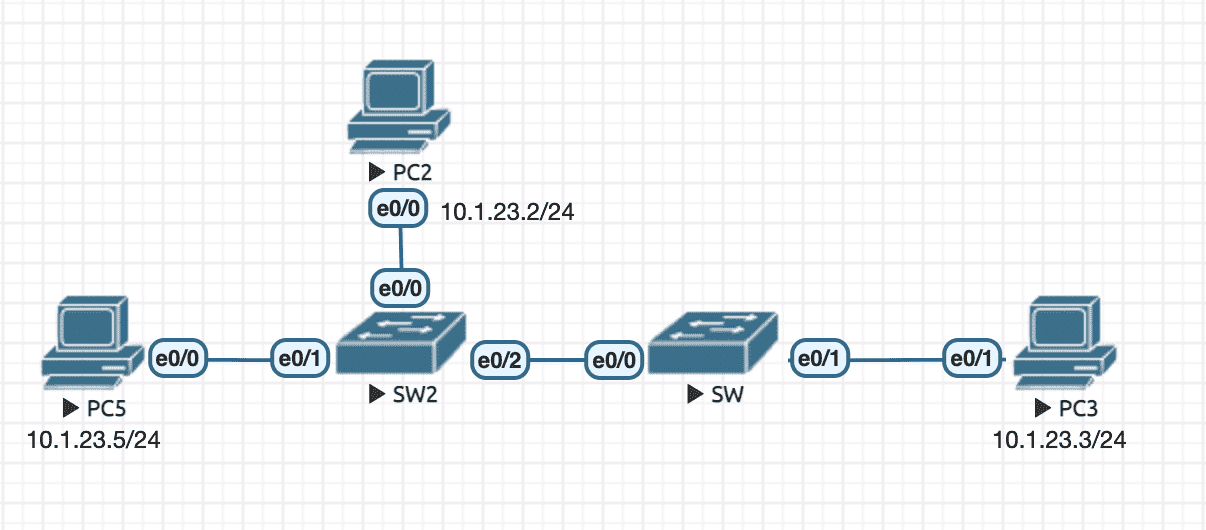
Figure 26: 实验环境
实验配置
----------------- SW ---------------------- en conf t hostname SW no ip do lo line con 0 exec-timeout 0 0 logging synchronous exit int e0/0 switchport mode access shutdown ! better to shutdown first switchport port-security ! have to add this config to enable port-security feature switchport port-security mac-address sticky no shutdown ----------------- SW2 ---------------------- en conf t hostname SW2 no ip do lo line con 0 exec-timeout 0 0 logging synchronous exit int e0/2 switchport mode access ! not to send DTP no cdp enable ! not to send CDP no spanning-tree vlan 1 ! not to send STP ----------------- PC2 ---------------------- en conf t hostname PC2 no ip routing no ip do lo line con 0 exec-timeout 0 0 logging synchronous exit int e0/0 ip address 10.1.23.2 255.255.255.0 no sh ----------------- PC3 ---------------------- en conf t hostname PC3 no ip routing no ip do lo line con 0 exec-timeout 0 0 logging synchronous exit int e0/1 ip address 10.1.23.3 255.255.255.0 no sh ----------------- PC5 ---------------------- en conf t hostname PC5 no ip routing no ip do lo line con 0 exec-timeout 0 0 logging synchronous exit int e0/0 ip address 10.1.23.5 255.255.255.0 no sh
PC2 和 PC5 谁第一个与 PC3 通信,谁就占据端口,后来者如果也尝试与 PC3 通信,则 SW e0/0 会触发 err-disable 。
7.1.2 Static CAM
基于源 MAC 限制 流量。
SW(confit)#mac address-table static aabb.cc00.2000 vlan 1 drop 6
7.1.3 Block UNKNOWN unicast/multicast 7
7.2 Anti VLAN attack
7.2.1 VACL
VACL 可以匹配 IP 或者 MAC 地址,并作出响应的动作 Forward 或是 Drop 。
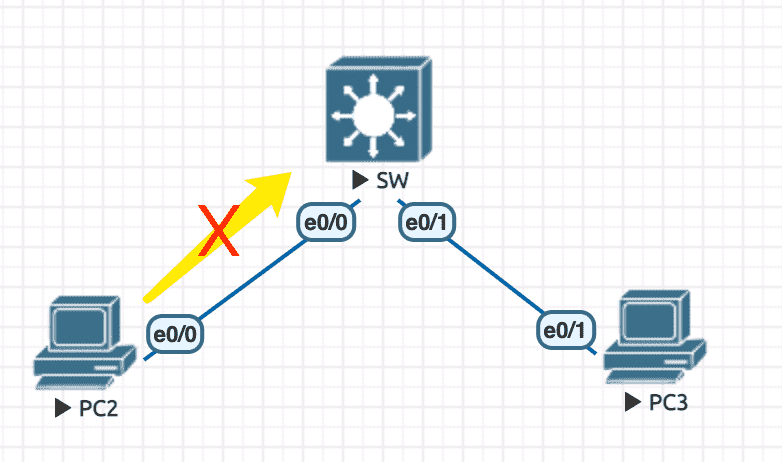
Figure 27: 实验环境
初始配置
----------------- SW ---------------------- en conf t hostname SW no ip do lo line con 0 exec-timeout 0 0 logging synchronous exit vlan 100 name MYVLAN100 exit int range e0/0,e0/1 switchport access vlan 100 switchport mode access spanning-tree portfast ! nice to have ----------------- PC2 ---------------------- en conf t hostname PC2 no ip do lo line con 0 exec-timeout 0 0 logging synchronous exit int e0/0 ip address 100.1.1.2 255.255.255.0 no sh ----------------- PC3 ---------------------- en conf t hostname PC3 no ip do lo line con 0 exec-timeout 0 0 logging synchronous exit int e0/1 ip address 100.1.1.3 255.255.255.0 no sh
基于 IP 的访问控制
----------------- SW ----------------------
en
conf t
hostname SW
no ip do lo
line con 0
exec-timeout 0 0
logging synchronous
exit
vlan 100
name MYVLAN100
exit
int range e0/0,e0/1
switchport access vlan 100
switchport mode access
spanning-tree portfast ! nice to have
exit
ip access-list standard PC2
permit 100.1.1.2
exit
vlan access-map PC2_MAP 10
match ip address PC2
action drop
exit
vlan filter PC2_MAP vlan-list 100
基于 MAC 的访问控制
----------------- SW ----------------------
en
conf t
hostname SW
no ip do lo
line con 0
exec-timeout 0 0
logging synchronous
exit
vlan 100
name MYVLAN100
exit
int range e0/0,e0/1
switchport access vlan 100
switchport mode access
spanning-tree portfast ! nice to have
exit
mac access-list extended PC2_MAC
permit host aabb.cc00.2000 any
exit
vlan access-map PC2_ACCESS_MAP 10
match mac address PC2_MAC
action drop
exit
vlan filter PC2_ACCESS_MAP vlan-list 100
7.2.2 PVLAN
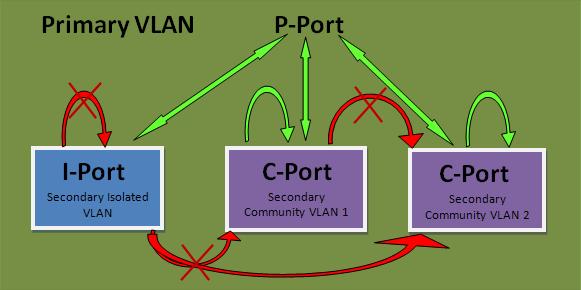
Figure 28: PVLAN 端口隔离
7.2.2.1 规则
- 一个主 VLAN 中 只能有一个 隔离子 VLAN , 可以有多个 Community 子 VLAN
- 隔离 VLAN 内的主机间不能相互访问,也不能和其他子 VLAN ,也不能和外部 VLAN 访问,只能访问混杂端口
- Community VLAN 内的主机间可以相互访问,可以和混杂端口访问,但不能访问其他子 VLAN ,也不能访问外部 VLAN
7.2.2.2 配置
配置步骤:
- VTP mode 设为 transparent
- 配置 Primary/Secondary VLAN 并进行关联 (
private-vlan association) - 将端口划入相应 VLAN (
switchport mode private-vlan promiscuous/host)
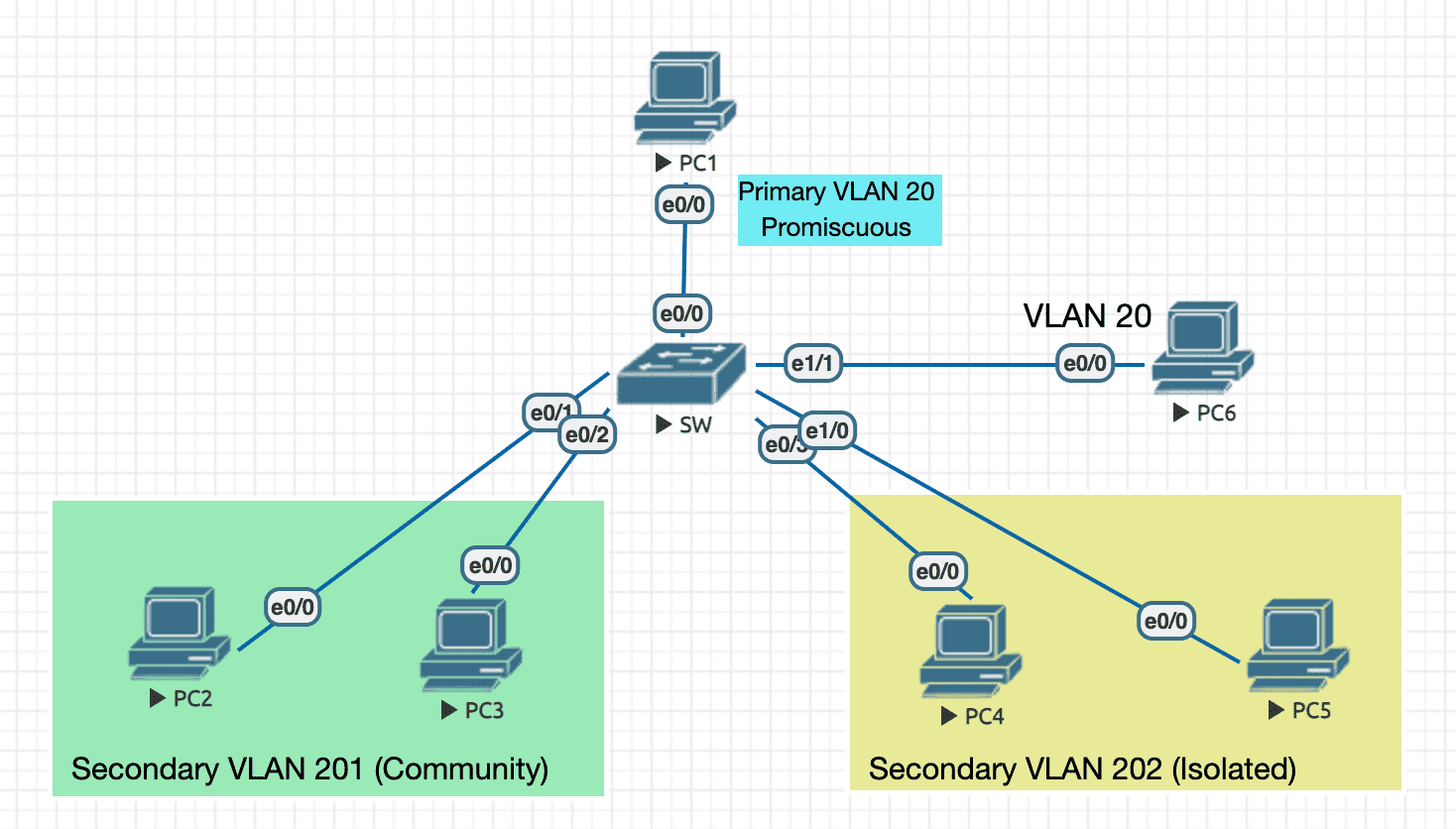
Figure 29: 实验环境
实验配置
----------------- SW ---------------------- en conf t hostname SW ip routing no ip do lo line con 0 exec-timeout 0 0 logging synchronous exit spanning-tree portfast edge default ! nice to have vtp mode transparent ! must do this for pvlan vlan 201 name SECONDARY_COMMUNITY_VLAN_201 private-vlan community exit vlan 202 name SECONDARY_ISOLATED_VLAN_202 private-vlan isolated exit vlan 20 name PRIMARY_VLAN_20 private-vlan primary private-vlan association 201,202 ! associate with secondary vlans exit int vlan 20 ip address 10.1.1.20 255.255.255.0 private-vlan mapping 201,202 ! must have this, orelse only R1 can access svi no sh int e0/0 ! R1 switchport mode private-vlan promiscuous switchport private-vlan mapping 20 201,202 ! specify secondary vlans to which we need access exit int range e0/1,e0/2 ! R2, R3 switchport mode private-vlan host switchport private-vlan host-association 20 201 exit int range e0/3,e1/0 ! R4, R5 switchport mode private-vlan host switchport private-vlan host-association 20 202 int e1/1 ! R6 switchport mode access switchport access vlan 20 ! cannot access ports under primary/secondary vlan 20 actually ----------------- PC1 ---------------------- en conf t hostname PC1 no ip routing no ip do lo line con 0 exec-timeout 0 0 logging synchronous exit int e0/0 ip address 10.1.1.1 255.255.255.0 no sh ----------------- PC2 ---------------------- en conf t hostname PC2 no ip routing no ip do lo line con 0 exec-timeout 0 0 logging synchronous exit int e0/0 ip address 10.1.1.2 255.255.255.0 no sh ----------------- PC3 ---------------------- en conf t hostname PC3 no ip routing no ip do lo line con 0 exec-timeout 0 0 logging synchronous exit int e0/0 ip address 10.1.1.3 255.255.255.0 no sh ----------------- PC4 ---------------------- en conf t hostname PC4 no ip routing no ip do lo line con 0 exec-timeout 0 0 logging synchronous exit int e0/0 ip address 10.1.1.4 255.255.255.0 no sh ----------------- PC5 ---------------------- en conf t hostname PC5 no ip routing no ip do lo line con 0 exec-timeout 0 0 logging synchronous exit int e0/0 ip address 10.1.1.5 255.255.255.0 no sh ----------------- PC6 ---------------------- en conf t hostname PC6 no ip routing no ip do lo line con 0 exec-timeout 0 0 logging synchronous exit int e0/0 ip address 10.1.1.6 255.255.255.0 no sh
查看 pvlan 信息
SW#sh vlan private-vlan Primary Secondary Type Ports ------- --------- ----------------- ------------------------------------------ 20 201 community Et0/0, Et0/1, Et0/2 20 202 isolated Et0/0, Et0/3, Et1/0 SW#sh int e0/0 switchport Name: Et0/0 Switchport: Enabled Administrative Mode: private-vlan promiscuous Operational Mode: private-vlan promiscuous Administrative Trunking Encapsulation: negotiate Operational Trunking Encapsulation: native Negotiation of Trunking: Off Access Mode VLAN: 1 (default) Trunking Native Mode VLAN: 1 (default) Administrative Native VLAN tagging: enabled Voice VLAN: none Administrative private-vlan host-association: none Administrative private-vlan mapping: 20 (PRIMARY_VLAN_20) 201 (SECONDARY_COMMUNITY_VLAN_201) 202 (SECONDARY_ISOLATED_VLAN_202) Administrative private-vlan trunk native VLAN: none Administrative private-vlan trunk Native VLAN tagging: enabled Administrative private-vlan trunk encapsulation: dot1q Administrative private-vlan trunk normal VLANs: none Administrative private-vlan trunk associations: none Administrative private-vlan trunk mappings: none Operational private-vlan: 20 (PRIMARY_VLAN_20) 201 (SECONDARY_COMMUNITY_VLAN_201) 202 (SECONDARY_ISOLATED_VLAN_202) Trunking VLANs Enabled: ALL Pruning VLANs Enabled: 2-1001 Capture Mode Disabled Capture VLANs Allowed: ALL Protected: false Appliance trust: none SW#sh int e0/1 switchport Name: Et0/1 Switchport: Enabled Administrative Mode: private-vlan host Operational Mode: private-vlan host Administrative Trunking Encapsulation: negotiate Operational Trunking Encapsulation: native Negotiation of Trunking: Off Access Mode VLAN: 1 (default) Trunking Native Mode VLAN: 1 (default) Administrative Native VLAN tagging: enabled Voice VLAN: none Administrative private-vlan host-association: 20 (PRIMARY_VLAN_20) 201 (SECONDARY_COMMUNITY_VLAN_201) Administrative private-vlan mapping: none Administrative private-vlan trunk native VLAN: none Administrative private-vlan trunk Native VLAN tagging: enabled Administrative private-vlan trunk encapsulation: dot1q Administrative private-vlan trunk normal VLANs: none Administrative private-vlan trunk associations: none Administrative private-vlan trunk mappings: none Operational private-vlan: 20 (PRIMARY_VLAN_20) 201 (SECONDARY_COMMUNITY_VLAN_201) Trunking VLANs Enabled: ALL Pruning VLANs Enabled: 2-1001 Capture Mode Disabled Capture VLANs Allowed: ALL Protected: false Appliance trust: none
- PC6 不能与任何 PC 互访 (包括 SVI)
- PC1(promiscuous) 可以与除 PC6 以外的任何 PC 互访
- 如果没有
private-vlan mapping 201,202,SVI 默认只能与 PC1(promiscuous) 互访 - PC2 与 PC3 可以互访,但不能访问 VLAN 202 中的 PC
- VLAN 202 中的 PC 不能互访,与外界也不能互访
7.2.3 protected 8
protected 端口之间不能互访。

Figure 30: 实验环境
实验配置
----------------- SW ---------------------- en conf t hostname SW no ip do lo line con 0 exec-timeout 0 0 logging synchronous exit spanning-tree portfast edge default ! nice to have int e0/2 ! R2 switchport protected exit int e0/3 ! R3 switchport protected exit exit ----------------- PC1 ---------------------- en conf t hostname PC1 no ip routing no ip do lo line con 0 exec-timeout 0 0 logging synchronous exit int e0/0 ip address 10.1.1.1 255.255.255.0 no sh ----------------- PC2 ---------------------- en conf t hostname PC2 no ip routing no ip do lo line con 0 exec-timeout 0 0 logging synchronous exit int e0/0 ip address 10.1.1.2 255.255.255.0 no sh ----------------- PC3 ---------------------- en conf t hostname PC3 no ip routing no ip do lo line con 0 exec-timeout 0 0 logging synchronous exit int e0/0 ip address 10.1.1.3 255.255.255.0 no sh
7.3 Anti Snoofing attack
7.3.1 DHCP Snooping
当部署了 DHCP Snooping 后,交换机上所有端口都会置为 untrusted 。
trusted 端口直连 DHCP 服务器,或是位于连接 DHCP 服务器的上行链路上。
- untrusted
- 接收 Discovery (host -> sw)
- 不发出 Discovery (sw -> host)
- 不接收 Offer (host -> sw)
- 发送 Offer (sw -> host)
- trusted
- 接收/发送任何 DHCP 消息
部署 DHCP Snooping : 1) ip dhcp snooping // 开启 DHCP Snooping 开关 2) ip dhcp snooping vlan 1 // 指定 vlan 3) ip dhcp snooping trust // 配置连接合法 DHCP Server 的接口与交换机之间的 trunk 接口为信任接口 4) ip dhcp relay information trust-all // 在 cisco DHCP Server 上,设置信任 DHCP 消息 (cisco 交换机会在 Discovery 消息里添加 optiona82 ,相当于篡改了消息,需要此条命令允许这种行为)

Figure 31: trust 接口发出的 DHCP Discovery 会带上 Option82
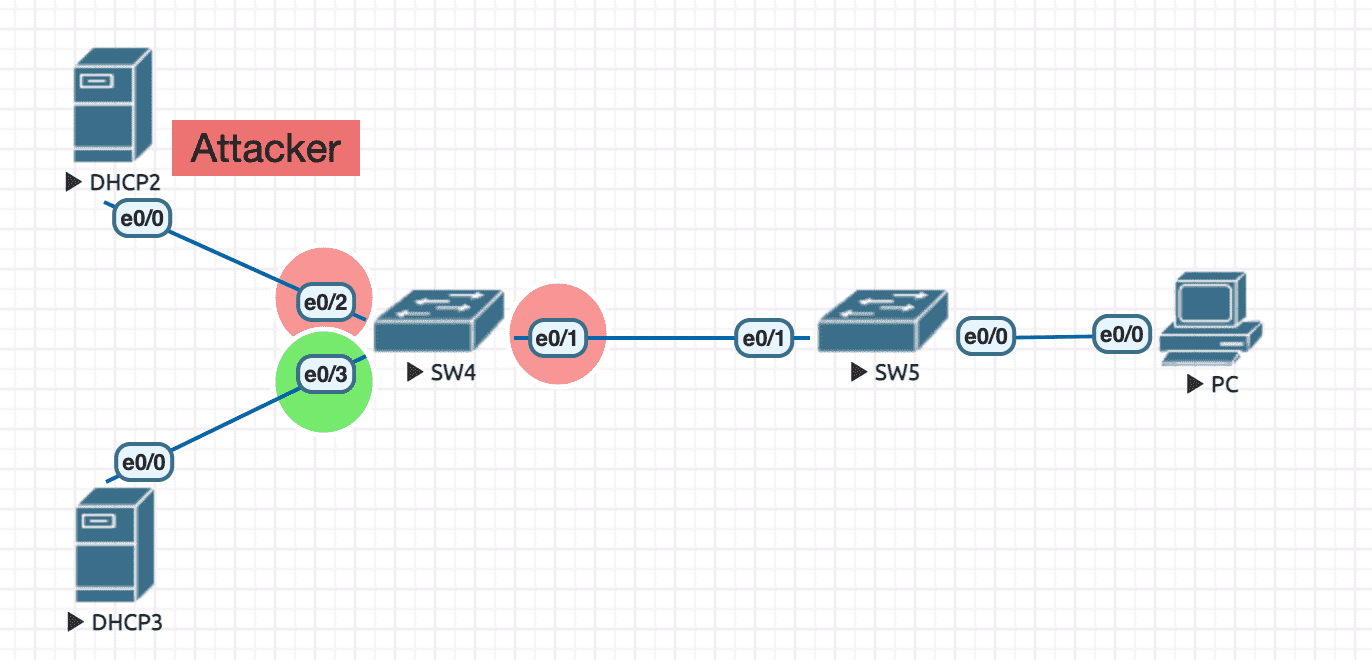
Figure 32: 实验环境
实验配置
----------------- SW4 ---------------------- en conf t hostname SW4 no ip do lo line con 0 exec-timeout 0 0 logging synchronous exit ip dhcp snooping ! must have this ip dhcp snooping vlan 1 ! all ports will be untrusted when this line takes effect int e0/3 ip dhcp snooping trust exit exit ----------------- DHCP2 ---------------------- en debug ip packet detail conf t hostname DHCP2 no ip do lo line con 0 exec-timeout 0 0 logging synchronous exit ip dhcp pool MYPOOL network 2.2.2.0 /24 exit int e0/0 ip address 2.2.2.2 255.255.255.0 no sh exit exit ----------------- DHCP3 ---------------------- en debug ip packet detail conf t hostname DHCP3 no ip do lo line con 0 exec-timeout 0 0 logging synchronous exit ip dhcp pool MYPOOL network 3.3.3.0 /24 exit ip dhcp relay information trust-all ! have to add this after switch port set to trusted. let dhcp server accept option82 int e0/0 ip address 3.3.3.3 255.255.255.0 no sh exit exit
查看绑定信息
SW4#sh ip dhcp snooping binding MacAddress IpAddress Lease(sec) Type VLAN Interface ------------------ --------------- ---------- ------------- ---- -------------------- AA:BB:CC:00:10:00 3.3.3.2 85408 dhcp-snooping 1 Ethernet0/1 Total number of bindings: 1 SW4#sh ip dhcp snooping Switch DHCP snooping is enabled Switch DHCP gleaning is disabled DHCP snooping is configured on following VLANs: 1 DHCP snooping is operational on following VLANs: 1 DHCP snooping is configured on the following L3 Interfaces: Insertion of option 82 is enabled circuit-id default format: vlan-mod-port remote-id: aabb.cc00.4000 (MAC) Option 82 on untrusted port is not allowed Verification of hwaddr field is enabled Verification of giaddr field is enabled DHCP snooping trust/rate is configured on the following Interfaces: Interface Trusted Allow option Rate limit (pps) ----------------------- ------- ------------ ---------------- Ethernet0/3 yes yes unlimited Custom circuit-ids:
7.3.2 IP 源保护 9
该功能配置于 untrusted 接口。
未通过 DHCP 获得 IP 前,即交换机没有向 client 转发过 Offer (没有形成 dhcp snooping binding 表),
端口上接收到的 client 数据都会被丢弃。即检查数据包的 src ip 是否出现在 dhcp snooping binding 中,如出现的,就是合法的。
ip source binding 0011.0022.0033 vlan 1 192.168.1.100 interface e0/1 # 静态绑定,同时 DHCP Snooping 方式建立的 binding 是动态绑定 show ip dhcp snooping binding # 查看通过 DHCP Snooping 动态形成的绑定表 show ip source binding # 查看动态绑定表和静态绑定表 SW(config-if)#ip verify source # 在接口上开启源保护,检测从此接口收到的数据包源 IP 地址
7.3.2.1 MAC 源保护
可以在 IP 源保护的基础上增加 MAC 源保护的功能:
int e0/1 switchport mode access switchport port-security ip verify source port-security ! 会检查从此接口收的的数据包的源 IP 与源 MAC !
7.3.3 Dynamic ARP Inspection 10
DAI 定义两种端口状态:
untrusted
对于收到的 ARP Request (包括 Gratuitous ARP) ,会基于 DHCP Snooping Binding 表进行 IP/MAC 关联检查
trusted
正常收发
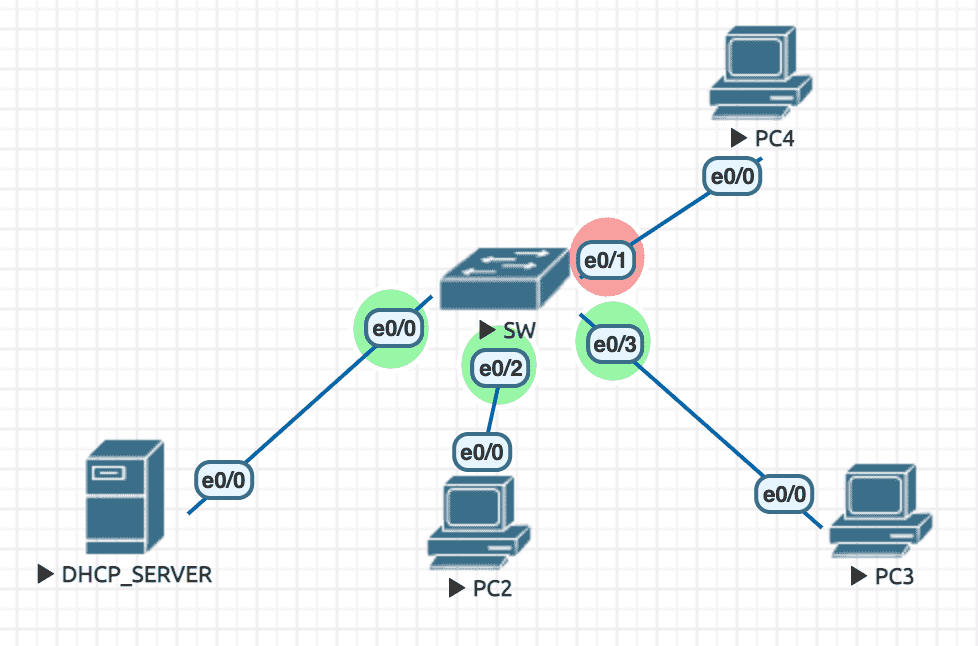
Figure 33: 实验环境
实验配置
----------------- PC2 ---------------------- en conf t hostname PC2 no ip do lo line con 0 exec-timeout 0 0 logging synchronous exit int e0/0 ip address dhcp no sh exit exit ----------------- PC3 ---------------------- en conf t hostname PC3 no ip do lo line con 0 exec-timeout 0 0 logging synchronous exit int e0/0 ip address dhcp no sh exit exit ----------------- PC4 ---------------------- en conf t hostname PC4 no ip do lo line con 0 exec-timeout 0 0 logging synchronous exit int e0/0 ip address 10.1.1.100 255.255.255.0 no sh exit exit ----------------- SW ---------------------- en conf t hostname SW no ip do lo line con 0 exec-timeout 0 0 logging synchronous exit ip dhcp snooping ! must have this ip dhcp snooping vlan 1 int e0/0 ip dhcp snooping trust exit int range e0/0,e0/2,e0/3 ip arp inspection trust ip arp inspection vlan 1 exit ----------------- DHCP_SERVER ---------------------- en conf t hostname DHCP_SERVER no ip do lo line con 0 exec-timeout 0 0 logging synchronous exit ip dhcp pool MYPOOL network 10.1.1.0 /24 exit ip dhcp relay information trust-all ! have to add this after switch port set to trusted. let dhcp server accept option82 int e0/0 ip address 10.1.1.1 255.255.255.0 no sh exit exit
信息查看
SW#sh ip dhcp snooping binding ! 绑定表 MacAddress IpAddress Lease(sec) Type VLAN Interface ------------------ --------------- ---------- ------------- ---- -------------------- AA:BB:CC:00:30:00 10.1.1.6 85495 dhcp-snooping 1 Ethernet0/3 AA:BB:CC:00:20:00 10.1.1.5 85468 dhcp-snooping 1 Ethernet0/2 Total number of bindings: 2 SW#sh ip arp inspection interfaces Interface Trust State Rate (pps) Burst Interval --------------- ----------- ---------- -------------- Et0/0 Trusted None N/A Et0/1 Untrusted 15 1 Et0/2 Trusted None N/A Et0/3 Trusted None N/A
告警信息
当 PC4 尝试 ping PC2/PC3 :
SW#
*Jul 15 11:08:24.228: %SW_DAI-4-DHCP_SNOOPING_DENY: 1 Invalid ARPs (Req) on Et0/1, vlan 1.([aabb.cc00.4000/10.1.1.100/0000.0000.0000/10.1.1.5/13:08:23 EET Thu Jul 15 2021])
SW#
7.4 Telnet/SSH
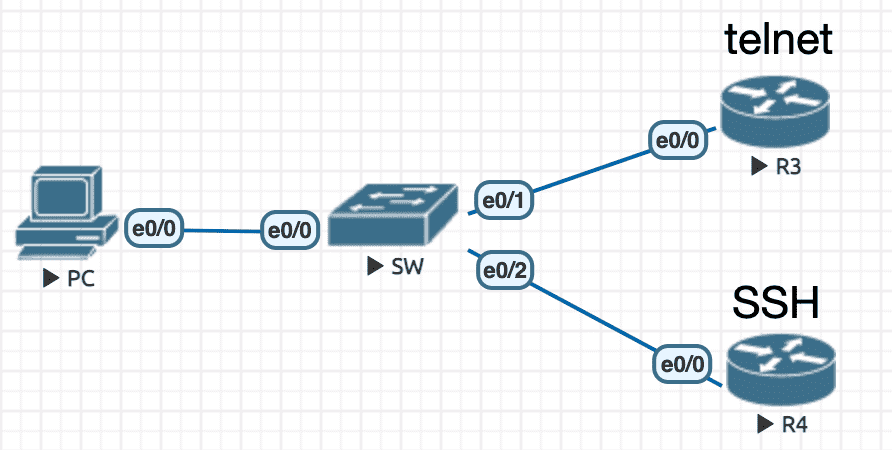
Figure 34: 实验环境
实验配置
----------------- PC ---------------------- en conf t hostname PC no ip do lo line con 0 exec-timeout 0 0 logging synchronous exit int e0/0 ip address 10.1.1.1 255.255.255.0 no sh exit exit ----------------- R3 ---------------------- en conf t hostname R3 no ip do lo line con 0 logging synchronous exit int e0/0 ip address 10.1.1.3 255.255.255.0 no sh exit username cisco password 0 cisco line vty 0 4 login local ! 'local' is meant to use the local database for authentication transport input telnet exit end ----------------- R4 ---------------------- en conf t hostname R4 no ip do lo line con 0 exec-timeout 0 0 logging synchronous exit int e0/0 ip address 10.1.1.4 255.255.255.0 no sh exit ip domain name cisco.com crypto key generate rsa general-keys modulus 1024 ip ssh time-out 120 ip ssh authentication-retries 4 username cisco password 0 cisco line vty 0 4 login local ! 'local' is meant to use the local database for authentication transport input ssh exit exit
尝试登陆
PC#telnet 10.1.1.3 Trying 10.1.1.3 ... Open User Access Verification Username: cisco Password: R3>exit [Connection to 10.1.1.3 closed by foreign host] PC#ssh -l cisco 10.1.1.4 Password: R4>exit [Connection to 10.1.1.4 closed by foreign host]